#...but it's also considered to be derogative
Explore tagged Tumblr posts
Text

@megitsuneko said ; ✿ can i hab for dante and moriarty lily pwease / from : 𝐏𝐑𝐄-𝐄𝐒𝐓𝐀𝐁𝐋𝐈𝐒𝐇𝐄𝐃 𝐑𝐄𝐋𝐀𝐓𝐈𝐎𝐍𝐒𝐇𝐈𝐏 𝐌𝐄𝐌𝐄 𝟎.𝟐

; 𝐃𝐀𝐍𝐓𝐄

FRIENDSHIP. childhood friends / work buddies or coworkers / family friends / friends with benefits / smoking buddies / adventure buddies / fake friends / recently friends / party buddies / friendship of need / dying friendship / circumstantial friendship / partners in crime / old friendship / [ your muse ] is the good influence / [ your muse ] is the 'bad' influence / [ my muse ] is the good influence / [ my muse ] is the bad influence / opposites attract / ride or die / frenemies / roommates or flatmates / penpals / exes to friends / enemies to friends / other
ROMANCE. childhood sweethearts / [ your muse is mines ] childhood crush / [ my muse is yours ] childhood crush / exes / exes to lovers / forbidden lovers / highschool sweethearts / secret relationship / opposites attract / long distance / unrequited [ from your muses side ] / unrequited [ from my muses side ] / unrequited [ from both sides ] / skinny love / friends to lovers / enemies to lovers / spurious relationship / power couple / newly entered / soulmates [ metaphorical ] / soulmates [ literal ] / awkward / turning toxic / toxic love / cheating [ on your muse ] / cheating [ with your muse ] / other
FAMILIAL. siblings [ half ] / siblings [ step ] / [ my muse ] is an older sibling figure to your younger sibling figure / [ my muse ] is a younger sibling figure to your older sibling figure muse / [ my muse ] is a parental figure to yours / [ my muse ] is a child figure to your muse / guardian figure / legal guardian / adoptive child / foster child / [ your muse ] is taken under mines wing / [ my muse ] is taken under yours wing / other
ANTAGONISTIC. dangerous to each other / dangerous to others / unpredictable / rivals / petty / developing into sexual or romantic tension / based off family matters / based of off circumstance / based of professional matters / based off misunderstanding or lies / conflict of ideology / betrayal / hero - villain dynamic / enemies / fight club / friends turned enemies / lovers turned enemies / exes turned enemies / other
; 𝐌𝐎𝐑𝐈𝐀𝐑𝐓𝐘

FRIENDSHIP. childhood friends / work buddies or coworkers / family friends / friends with benefits / smoking buddies / adventure buddies / fake friends / recently friends / party buddies / friendship of need / dying friendship / circumstantial friendship / partners in crime / old friendship / [ your muse ] is the good influence / [ your muse ] is the bad influence / [ my muse ] is the good influence / [ my muse ] is the bad influence / opposites attract / ride or die / frenemies / roommates or flatmates / penpals / exes to friends / enemies to friends / other
ROMANCE. childhood sweethearts / [ your muse is mines ] childhood crush / [ my muse is yours ] childhood crush / exes / exes to lovers / forbidden lovers / highschool sweethearts / secret relationship / opposites attract / long distance / unrequited [ from your muses side ] / unrequited [ from my muses side ] / unrequited [ from both sides ] / skinny love / friends to lovers / enemies to lovers / spurious relationship / power couple / newly entered / soulmates [ metaphorical ] / soulmates [ literal ] / awkward / turning toxic / toxic love / cheating [ on your muse ] / cheating [ with your muse ] / other
FAMILIAL. siblings [ half ] / siblings [ step ] / [ my muse ] is an older sibling figure to your younger sibling figure / [ my muse ] is a younger sibling figure to your older sibling figure muse / [ my muse ] is a parental figure to yours / [ my muse ] is a child figure to your muse / guardian figure / legal guardian / adoptive child / foster child / [ your muse ] is taken under mines wing / [ my muse ] is taken under yours wing / other
ANTAGONISTIC. dangerous to each other / dangerous to others / unpredictable / rivals / petty / developing into sexual or romantic tension / based off family matters / based of off circumstance / based of professional matters / based off misunderstanding or lies / conflict of ideology / betrayal / hero - villain dynamic / enemies / fight club / friends turned enemies / lovers turned enemies / exes turned enemies / other
#megitsuneko#/bold is like;; 'mmm i can see it'; italicized is 'i -could- see it'; SOMETHING LIKE THAT#/THANK U FOR SENDING THIS IN K.ARINNN#/so starting with d.ante- i actually would have never guessed u would pick either of these two OIEUTORIUTR#BUT!! now that im put on the position to think about the possible type of dynamics they could have; IM SEEING IT-#for d.ante i feel like they would be funny together bc t.suyu is very carefree in comparison to d.ante#like she's really the type of 'i'll live my life however i please' while d.ante is more guarded in some cases; the shame and guilt hang-#over his head all the time and dictate a lot about his behavior#like he's really passionate but he fears giving in to those passions u see;; he has some sort of religious guilt thing going on and#something of a double standard- that he cant notice a lot of times#he isn't someone that exactly follows what he thinks all the time; he's very human- so even if he shames himself; sometimes he does t-#-things that arent precisely considered righteous or honorable or correct or virtuous things that he considers beautiful#so i feel like their dynamic would be like;; them in some club and d.ante yelling over the club music 'DO YOU THINK WE'RE EVER TRULY FORGIV#EUITHIERURIUHRDUGIUTU TERRIBLEEEEEE#im also snatching the idea of this poetical role of him now being the one who guides#compared to how he was in his stories as the one who was guided (by virgil); and being something like her guardian#like that lil conciousness on ur shoulder that goes oh goodness gracious that wont do!!! we'll go to hell!!!#as for m.oriarty; EVIL AND EVIL!! i know its more nuanced than that but u get the idea#i think it would be funny if they could NOT stand each other's ahh#like 'Oh -you- again.' (DEROGATIVE)#but are somehow connected each time something happens like;; why are you stepping all over my business AGAIN#forced to cooperate and hating every second of it OTIRUTORT#they either find something neat about each other or are incredibly petty about each other#i italicized enemies to lovers bc it could happen too; but I think on his end he would be way too prideful to admit#that he's been too lenient on her trampling over his 'businesses'#like if there was romance in there; it would def be the type of -exasperated- hateship OEITYOERIYTOE#cannot stand that capricious woman!! -keeps standing it-#theres something about stoic no-nonsense 100% logical guy and playful thrill seeker lady#yet they meet on one thing which is precisely that 'thrill seeking' in their own chaotic ways#of being SHOW OFFS
2 notes
·
View notes
Note
hey you might've been asked this before sorry if so, but have you read or do you have any thoughts on A short history of Trans Misogyny?
I have read it! I have a few thoughts.
I think it's a strong and important work that compiles historical archives into sharp analyses of how "trans misogyny" (using Jules Gill-Peterson's spacing) is not a recent phenomenon but a globalized structure with centuries of history. I also think it's flawed, for reasons I'll get into after a quick summary for those who haven't had the chance to read it yet.
JGP divides the book into three main chapters, the first on the notion of "trans panic". There, she traces how variants of this anxiety with the trans-feminized subject have presented—to deadly effect, for the subject—in such different settings as early colonial India, the colonization of the Americas, the racialized interactions between US soldiers stationed in the Philippines and the local trans women living there, and of course the contemporary United States itself. In every case she analyzes this "panic" as the reaction of the capitalist colonial enterprise to the conceptual threat that the trans-feminized subject poses; we are a destabilizing entity, a gender glitch that undermines the rigid guarantees of the patriarchal order maintaining capitalism. Punishment follows.
The second chapter is my favourite, and considers the relationship between transfeminine life and sex work. I posted a concluding excerpt but the thrust of the chapter is this: that the relegation of so many trans women and trans-feminized people to sex work, while accompanied by the derogation and degradation that is associated with sex work, is not itself the mere result of that degradation inflicted upon the subject. In other words, it is not out of pure helplessness and abjection that so many trans-feminized people are involved in sex work. Rather, sex work is a deliberate and calculated choice made by many trans-feminized people in increasingly service-based economies that present limited, often peripheralized, feminized, and/or reproductive, options for paid labour. Paired with a pretty bit of critical confabulation about the histories of Black trans-feminized people travelling the US in the 19th century, I think this made for great reading.
In her third chapter, JGP narrativizes the 20th century relationship between the "gay" and "trans" movements in north america—scare quoted precisely because the two went hand-in-hand for much of their history. She emphasizes this connection, not merely an embedding of one community within another but the tangled mutualism of experiences and subjectivities that co-constituted one another, though not without tension. Then came the liberal capture of the gay rights movement around the 70s, which brought about the famous clashes between the radicalisms of Silvia Rivera and Marsha P Johnson (neither of whom, JGP notes, ever described themselves as trans women) and the institutions of gay liberalism that desired subsumption into the folds of capital. This is a "remember your history" type of chapter, and well-put.
I think JGP is correct to insist, in her introduction, on the globalizing-in-a-destructive-sense effects of the colonial export of trans womanhood. It is, after all, an identity conceived only mid-century to make sense of the medicalized trans subject; and "gender identity" itself (as JGP describes in Histories of the Transgender Child) is a psychomedical concept conceived to rein in the epistemic instability of trans existence. This is critical to keep in mind! But I also think JGP makes a few mistakes, and one of them has to do with this point.
In her first chapter, under the discussion of trans misogyny in colonial India, JGP of course uses the example of the hijra. Unfortunately, she commits two fundamental errors in her use: she mythologizes, however ambiguously, the "ascetic" lives of hijra prior to the arrival of British colonialism; and she says "it's important to say that hijras were not then—and are not today—transgender". In the first place, the reference to the "ascetism" of hijra life prior to the violence of colonialism is evocative of "third-gender" idealizations of primeval gender subjectivities. To put the problem simply: it's well and good to describe the "ritual" roles of gendered subjects people might try to construe contemporarily as "trans women", the priestesses and oracles and divinities of yore. But it is best not to do so too loftily. Being assigned to a particular form of ritualistic reproductive labour because of one's failure to be a man and inability to perform the primary reproductive labour of womanhood-proper is the very marker of the trans-feminized subject. "Ascetism" here obviates the reality that it wasn't all peachy before (I recommend reading Romancing the Transgender Native on this one). Meanwhile, in the after, it is just wrong that hijra are universally not transgender. Many organize specifically under the banners of transfeminism. It's a shame that JGP insists on keeping the trans-feminized life of hijra so firmly demarcated from what she herself acknowledges is globalized transness.
My second big complaint with the book is JGP's slip into a trap I have complained about many times: the equivocation of transfemininity with femininity (do you see why I'm not fond of being described as "transfem"?). She diagnoses the root of transmisogyny as a reaction to the femininity of trans women and other trans-feminized subjects. In this respect she explicitly subscribes to a form of mujerísima, and of the trans-feminized subject as "the most feminine" and (equivalent, as far as she's concerned) "the most woman". Moreover, she locates transfeminist liberation in a singular embrace of mujerísima as descriptive of trans-feminized subjectivity. As I've discussed previously, I think this is a misdiagnosis. Feminization is, of course, something that is done to people; it is certainly the case that the trans-feminized subject is in this way feminized for perceived gender-failure. This subject may simultaneously embrace feminized ways of being for all sorts of reasons. In both cases I think the feminization follows from, rather than precedes, the trans misogyny and trans-feminization, and there is a fair bit of masculinization as de-gendering at play too, to say nothing of the deliberate embrace of masculinity by "trans-feminized" subjects. Masculinity and femininity are already technologies of gender normalization—they are applied against gender deviation and adapted to by the gender deviant. The deviation happens first, in the failure to adhere to the expectations of gender assignment, and I don't think these expectations can be summarized by either masculinity or femininity alone. I think JGP is effectively describing the experience of many trans-feminized people, but I do not think what she presents can be the universalized locus of trans liberation she seems to want it to be.
Now for a pettier complaint that I've made before, but one that I think surfaces JGP's academic context. In her introduction she says:
In truth, everyone is implicated in and shaped by trans misogyny. There is no one who is purely affected by it to the point of living in a state of total victimization, just as there is no one who lives entirely exempt from its machinations. There is no perfect language to be discovered, or invented, to solve the problem of trans misogyny by labeling its proper perpetrator and victim.
Agreed that "there is no perfect language to be discovered"! But JGP is clearly critical of TMA/TME language here. Strange, then, that less than ten pages later she says this:
this book adds the phrase trans-feminized to describe what happens to groups subjected to trans misogyny though they did not, or still do not, wish to be known as transgender women.
So JGP believes it is coherent to talk about "groups subjected to trans misogyny", which she thinks consists of the union of trans women and what she called "trans-feminized" groups. If this is to be coherent, there must be groups not subjected to trans misogny. So we've come around to transmisogyny-subjected and not transmisogyny-subjected. Look: you cannot effectively theorize about transmisogyny without recognizing that its logic paints a particular target, and you will need to come up with a concise way of making this distinction. But JGP dismissing TMA/TME with skepticism about "perfect language" and immediately coining new language (basically TMS/not TMS) to solve the problem she un-solved by rejecting TMA/TME... it smells of a sloppy attempt to make a rhetorical point rather than theoretical rigour. It's frustrating.
I have other minor gripes, like her artificial separation of "trans women" from "nonbinary people" (cf. countless posts on here lamenting the narrow forms of existence granted TMA people if we want recognition as-such!) or her suggestion that "a politics of overcoming the gender binary" is mutually exclusive from rather than necessarily involved with struggles around "prison abolition, police violence, and sex work". Little things that give me the sense of theoretical tunnel-vision. But I don't think all this compromises the book's strengths as a work of broad historical analysis. I would simply not take every one of its claims as authoritative. Definitely give it a read if you have the chance, especially for the second and third chapters.
#ask answer#jules gill-peterson#(i haven't been asked this before ty for asking <3 🐐)#note that this was mostly off the cuff except what i had taken pictures of bc i left the book in toronto for my mom to read
547 notes
·
View notes
Text
Gender self-determination as a medical right
Florence Ashley, CMAJ, vol. 196, E833–35 (2024)
Transgender people face many formal barriers to gender-affirming care, sometimes known as “gatekeeping.” Gender-affirming care refers to a wide range of medical interventions that patients pursue to affirm, actualize, or embody their sense of gender. Common forms of gender-affirming care include transition-related surgeries, hormone therapy, puberty blockers, and hair removal. Health care providers may refuse to offer gender-affirming care to transgender patients without an assessment of the person’s gender identity or dysphoria. Adolescents may, moreover, need to show that they have experienced gender dysphoria for several years before receiving care and may be denied care until they satisfy a strict age requirement.
I argue that physicians should rethink barriers to gender-affirming care in light of the principle of gender self-determination. By considering gender self-determination as a presumptive right, physicians are more likely to avoid unnecessary barriers to care. This presumption can be rebutted by showing that encroachments are adequately justified under standards detailed later in this article. Presumptive rights contrast with absolute rights, which cannot be rebutted or derogated from.
Being transgender is a matter of diversity, not pathology. When providers create barriers to gender-affirming care, they impair their patients’ ability to live out their sense of gender. Not every transgender person wishes to pursue gender-affirming interventions — it is a deeply personal choice — but many do. In Canada, 73% of transgender people want to or have pursued some form of gender-affirming care, and another 16% are unsure.2 Yet, only 26% of transgender people have received all the gender-affirming care they desire.
Medical autonomy and everyday autonomy
At the heart of medical ethics lies the principle of autonomy, according to which patients must be free to act “in accordance with a self-chosen plan.” Autonomy is the reason that patients have a right to refuse care, and it underpins health care providers’ duty to properly inform patients so that they can decide whether to accept a proposed treatment. Medical autonomy is, however, asymmetric. Whereas patients have the right to refuse an intervention, medical autonomy does not typically afford them the right to demand a specific intervention from their doctor. Nor does medical autonomy generally prevent providers from imposing discretionary restrictions and conditions on access to care.
Gender-affirming care, however, also engages the principle of gender self-determination, which is related to “everyday” autonomy: a person’s right to decide the shape of the life they want to live. Gender is a critical factor in how others refer to you, what facilities you use, whom you date, which peers you have, how others treat you, and which social norms are applied to you. Furthermore, a person’s primary and secondary sexual characteristics play a central role in social and sexual intercourse; bodily features influence whether others perceive you as a man, a woman, or nonbinary, or as trans- or cisgender; and having certain body parts also influences your ability to do many things, such as use urinals or have penetrative sex. If you do not feel like your body reflects your sense of gender, you may experience persistent discomfort in everyday life and struggle to flourish in your social or romantic life. Feeling misperceived may also cause you to withdraw from meaningful relationships and can be a source of substantial distress.
Gatekeeping gender-affirming care therefore imposes important limits on liberty, dictating critical aspects of transgender individuals’ social, interpersonal, and embodied life. The impact on transgender people of gatekeeping gender-affirming care extends far beyond the medical realm, permeating the deepest reaches and crevices of transgender people’s lives and defining their ability to live as themselves.
The principle of gender selfdetermination
Gender self-determination means that individuals have a right to define, express, and embody their gender identity as they see fit. It is one of the cornerstones of the Yogyakarta Principles, developed in 2006 by leading human rights experts, which state that
Each person’s self-defined … gender identity is integral to their personality and is one of the most basic aspects of self-determination, dignity and freedom. … No one shall be subjected to pressure to conceal, suppress or deny their … gender identity.
The principle of gender self-determination can be derived from and is supported by many long-recognized rights, including the right to free speech, equality, privacy, identity, and dignity, and to live and act with integrity. As explained by Loukēs G. Loukaidēs, later of the European Court of Human Rights: “For [someone] to be able to function freely, in the full sense of the term, [they] must have the possibility of self-definition and self-determination: the right to be [oneself].” Gender self-determination is implicitly and explicitly recognized by multiple international actors, including the European Court of Human Rights and the Inter-American Court of Human Rights.
Gender self-determination as a medical right
The principle of gender self-determination shapes the ethical obligations of health care providers. Given the impact of gender-affirming care on people’s ability to express, embody, and live out their gender in everyday life, a presumptive right to gender-affirming care for transgender people would seem essential to supporting the principle of gender self-determination. Transgender patients are, in this sense, in a special situation that expands the traditional scope of medical autonomy, a reasoning perhaps best expressed in the decision of the European Court of Human Rights in Van Kück v. Germany, which explained that “the burden placed on a person to prove the medical necessity of treatment, including irreversible surgery, in the field of one of the most intimate private-life matters, appears disproportionate.”
Medical care often constrains everyday liberty, but there are differences of kind and degree when it comes to gender-affirming care. Gender-affirming care is a way for the person to shape themselves from a gendered perspective, not a means of treating an underlying pathology. If transgender existence is understood, as it should be, in terms of diversity rather than pathology, gender self-determination comes to the fore as a medical right, and approaches to gender-affirming care rooted in a conventional diagnostic-and-cure model seem out of place. Gender-affirming care can be considered along similar lines as abortion, which is also desired for its own sake and often framed as a right.
Reconsidering barriers to gender-affirming health care
Gender self-determination is a presumptive right, meaning that it can be outweighed by other considerations. The burden of justifying barriers to care should fall on the health care providers who erect them and not on those seeking care to affirm their gender. A barrier to gender-affirming care would be justified if there were clear and compelling evidence that it prevents harms of sufficiently great magnitude to unambiguously outweigh the barrier’s negative impacts on gender self-determination and well-being. The harm that barriers seek to prevent must be sufficiently serious to outweigh individuals’ autonomy in defining the most fundamental aspects of their personal identity, bearing in mind also that impairing one’s ability to live out one’s sense of gender is psychologically and socially harmful. It is important to remember that autonomy includes the right to make bad decisions for oneself. The freedom to make only good decisions would be meaningless.
For illustrative purposes, I wish to briefly touch on 2 common barriers to gender-affirming care: the requirement that adolescents prove several years of gender incongruence and rigid age requirements. The requirement that adolescents experience “several years of persistent gender diversity/incongruence” before initiating hormone therapy or surgery is not grounded in evidence that immediate access to gender-affirming interventions, without waiting several years, is associated with regret or negative mental health outcomes. Similarly, the use of rigid age requirements for certain interventions lacks empirical evidence and does not take into consideration differences in youths’ cognitive and emotional maturation. Contemporary understandings of autonomy recognize its gradual development and heterogeneity across the population, an understanding that is recognized in Canadian law under the mature minor doctrine. In the words of the Convention on the Rights of the Child, youths’ views must be “given due weight in accordance with the age and maturity of the child.” This calls for an individualized approach that is incompatible with rigid age lines. In the future, providers should also consider whether there is sufficient evidence justifying requirements for transgender adolescents and adults to prove their gender identity or dysphoria before offering care.
Conclusion
In this article, I have argued that providers of gender-affirming care have an ethical duty to respect the gender self-determination of patients and accordingly bear the burden of justifying the barriers they erect on access to gender-affirming care. Health care providers working with transgender communities should carefully examine their gatekeeping practices to ascertain whether they are justified by clear and compelling evidence and abandon those that cannot meet this justificatory threshold.
#lgbtq#queer#lgbtqia#transgender#trans#lgbt#trans rights#transgender rights#trans rights are human rights#gender affirming care#gender affirming healthcare#gender affirmation#medicine#human rights
186 notes
·
View notes
Text
Everyone seems to forget that Tsuna is affected not by one but by TWO "bad" parents. In this essay I will bring down both Iemitsu and Nana.
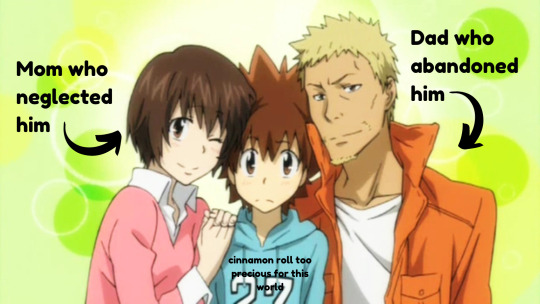
Iemitsu is considered a bad parent because Tsuna himself says so, and we gotta trust what the victim says. If Tsuna claims his father is a deadbeat father, than that's what his father is. Iemitsu might be a respected chief, an understanding mentor and a loving husband, there is no denying he fulfills those roles wonderfully well however, he falls short on his role as a father and that's the role Tsuna most needs out of him. Tsuna doesn't need his father to be a respected chief or an understanding mentor or a loving husband, he needs his father to be a father first and foremost. Instead, Iemitsu tells Nana to claim he was dead/missing. And she did (and I'll be coming back to this later). Now, not only did Tsuna have to live with the fact that his father up and left the house, he had to live with the fact that his father was also, very likely, dead.
Iemitsu-father was dead to Tsuna for two years, the boy had definitely come to terms with it by the start of the series. Except, Iemitsu wasn't dead at all. While it's treated as a comedy skit in the manga, the absolute rollercoaster of emotion Tsuna must have felt at that moment is unimaginable. "I lived with my mom and dad but then my dad started leaving for work until one day he stopped coming home, and then my mom told he was missing but he actually wasn't... oh, and he involved me in some dangerous mafia business", try explaining that to a therapist.
Offenses committed by Iemitsu:
Leave his son without an explanation while his son was at a vulnerable age (Tsuna was at least old enough to remember his dad leaving the house)
Telling his wife to write him off as dead/missing because "It's more romantic that way" (I haven't seen the episode in years but I just checked and that's exactly what he said, wtf)
Appearing in his son's life after being "dead" for years without a reasonable explanation (and no, claiming that he was doing that to protect his family is not an explanation, that's an excuse)
Appearing in his son's life only after he got said son involved in the mafia business
Disappearing as soon as everything is over and not being heard of again until he wants to
Acting like a father when he killed that role himself
I can understand the first offense, after all, Tsuna was a small boy when Iemitsu left. "You were a child, there was no need for you to know" is something adults repeatedly say when they refuse to elaborate on why they kept a child in the dark; and that's something I understand, I don't condone it but I do understand it. But Tsuna was clearly at an age where he could remember his dad leaving, he was at an age where he was emotionally grown-up enough to see his father leaving the house as being the same as being abandoned.
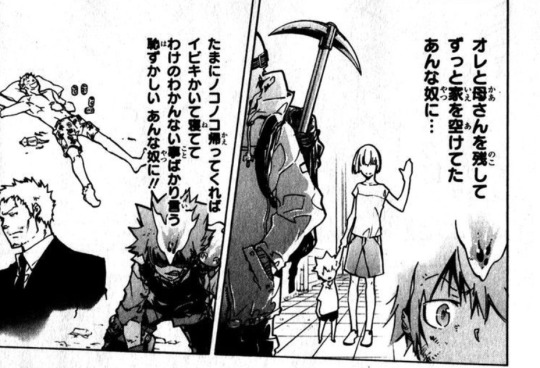
ツナ 「オレと母さんを残して ずっと家を空けてたあんな奴に・・・」
Tsuna uses the word 残す (nokosu) which means "to leave (behind)", which often carries a sense of forgetfulness, as though the act of leaving something behind was done because the person forgot about. "He left behind my mom and me" = "He forgot about us and left". And then he goes on to say "That guy (derogative) was always away from home", which further drives the point that Tsuna has some strong resentment towards his father for leaving without being heard of.
The second offense is, in my humble opinion, bullshit. The japanese use this particular word 「ロマン」 (roman) which is many times translated as "romantic", but which is used to describe a feeling of "pursuing impossible dreams or ideals which deeply define a character". This particular word is mostly used by japanese men to describe a feeling of longing for impossible dreams and ideals that women just cannot understand.
.
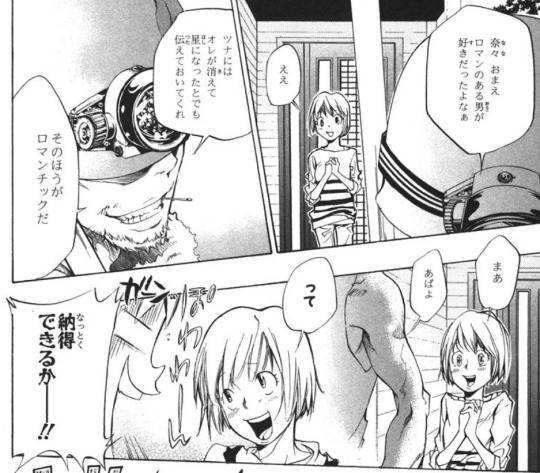
.
See what I mean?
Nana (I'm coming for you so sit tight) is so japanese in her essence that she's a woman who is attracted by the idea of a man chasing his impossible dreams (a man who is living the roman), and Iemitsu feeds on that by telling her to write him off as gone and "as becoming one with the stars", because that's more romantic than telling your kid his dad will be doing construction work. A husband and a wife who very obviously love each other and who both think living by their ideals is a much higher priority than their responsibility towards the child they brought into the world. The third offense shows how different Iemitsu and Tsuna are. Iemitsu claims he was keeping his family in the dark because that was how he protected them (through ignorance), and that's bullshit and Tsuna shows us exactly why, like a 100 or so chapters later. During the Future Arc, Tsuna was made to choice between telling his friends the whole truth or keeping them in the dark for their own safety (like Iemitsu). Tsuna decides to say the truth, because he knows what it means and what it feels like to be kept in the dark, especially regarding something that concerns the person directly. Tsuna made that decision because he had been in a similar position.
The fourth offense is perhaps there to show how incapable of being a father Iemitsu is. Iemitsu reappears in Tsuna's life only after Tsuna becomes involved with the mafia, because that's what Iemitsu is good at: the mafia. Perhaps Iemitsu was more involved in the mafia than he was in a normal family situation, which is why he lacks as a father, because he very simply doesn't know how to be a father. He can train, mentor and support Tsuna in the mafia way because that's what he knows how to do, however, that's not what Tsuna needs nor wants. Tsuna needed a father, but that father wrote himself off (so Tsuna unknowingly got another father and this one refuses to leave him alone) and Tsuna had to come to terms with the fact that he didn't have a father to depend on. And that's where the conflict between Tsuna and Iemitsu comes from: Iemitsu trying to act like a dad to the son he had educated to think of him as dead.
To Tsuna the situation must be something like this: his dad gave him up for adoption and now keeps coming back, trying to act like a dad because now the two of them shared the same hobby.
Sorry, Iemitsu, Tsuna found himself a better dad! Although you succeeded in ruining the dad-role for him, so now he's left with some complicated feelings towards Reborn, whom he sees as a figure he can depend on but whom he cannot call "dad" in fear it might end up like it did with you.
His fifth offense ties in with his fourth. Iemitsu only appears when there is something about the mafia going on and then disappears as soon as the situation is no longer related to the mafia. He only tries to act like a father to Tsuna when the mafia is involved, and that is absolute bullshit because that boy needs a father even outside of the mafia.
And finally his last and most important offense: how Iemitsu killed the image of a father in Tsuna's head.
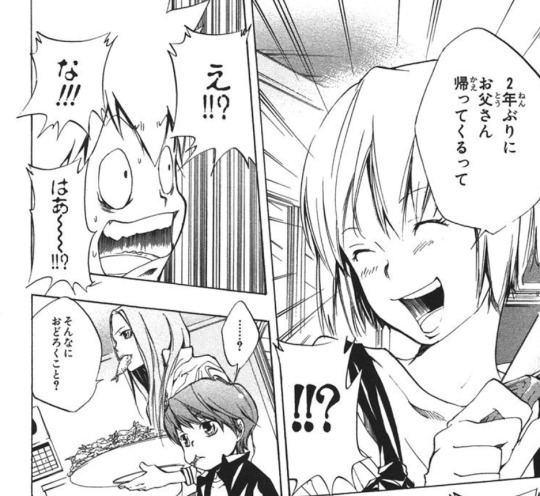
At hearing the news that his father will be back home, after 2 years, Tsuna's shocked reaction is treated more as a joke than a legitimate emotion someone might have towards the sudden undeadness of a father. Nana, his own mother, even goes as far as belittling him and his intelligence when she says (more explicitly in the anime): "Aww Tsuna, you actually believed that story about his disappearance?" and then "How do you think we pay for your school expenses and food, if he were really gone?"
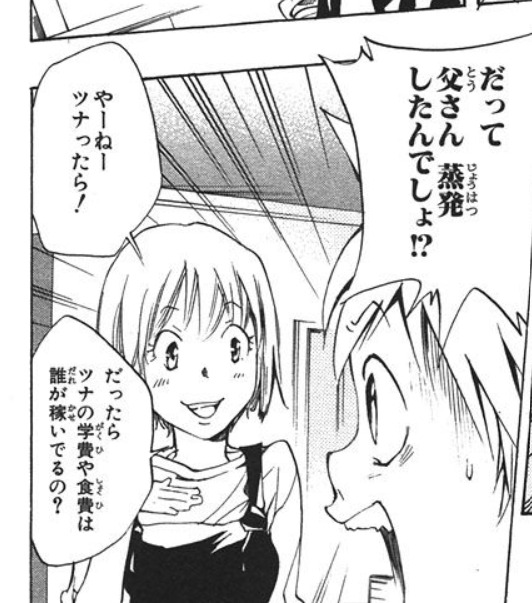
Iemitsu intentionally killed the existence known as "dad" in Tsuna's head, and Nana helped. Tsuna started the series convinced he no longer had a dad, which is why he ended up depending on Reborn, because Reborn was the first authoritative figure that called him a loser to his face while also believing Tsuna was much more than that. Reborn appeared exactly as the kind of figure Tsuna didn't know he needed in his life.
Though both Reborn and Iemitsu are there because of the mafia, Reborn stays for more than just the mafia, and Tsuna can see that. Iemitsu only interacts with Tsuna when the mafia is involved, while Reborn is there for him regardless of whether or not the mafia is involved. Reborn was sent there to make Tsuna the next boss, yet all Reborn did was make this loser of a kid get some confidence in himself and make some friends. Between a tutor whose intentions he knows (he's there to make him boss but somehow he's also trying to make him into a better person) and a dad whose intentions he doesn't know (he tries to teach him this mafia thing he really doesn't want to be involved in), Tsuna's heart chose the one figure he didn't know he always wanted in his life.
Nice going, Tsuna!
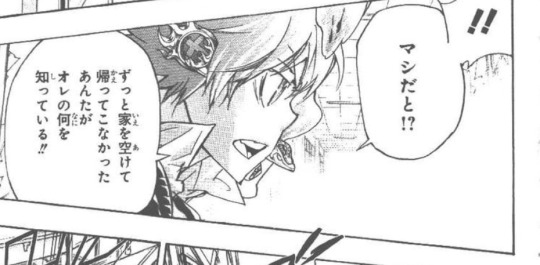
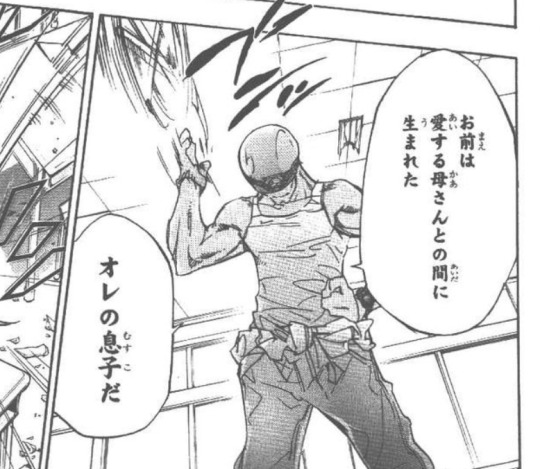
I bring this conversation between Tsuna and Iemitsu, which I think further shows the conflict between them.
ツナ 「帰ってこなかったあんたが オレの何が知っている!!」
家光 「お前は愛する母さんとの間に生まれた 俺の息子だ」
Tsuna: "What could you possibly understand about me?! If you're never home!" Iemitsu: "You are my son, born between me and the woman I love."
In what is a typical parent cliche, Iemitsu claims he knows Tsuna solely based on the fact that Tsuna is his son. This is a psychological trap which many parents seem to fall for: a belief that they will always know their children best because it is their children (and that their children might not know themselves because they are still children). Iemitsu fails to acknowledge that Tsuna is his own person and that he might not want to live by his ideals. As to why parents do this? Well, ego, most likely. A parent thinks themselves a god because they created a child, and refuse to acknowledge the fact that their child is just another person they will have to learn to know.
Now, Sawada Nana. The amount of information on this woman is so little that she might as well be of little influence to the plot, expect she's not!
Let's start from the beginning. Nana is described as being kind, but her kindness seems to only go so far, as she will and does ignore things she does not want to deal with. Reborn kicks her son in front of her? She leaves them alone. Her son keeps coming home with mysterious injuries? She ignores it.
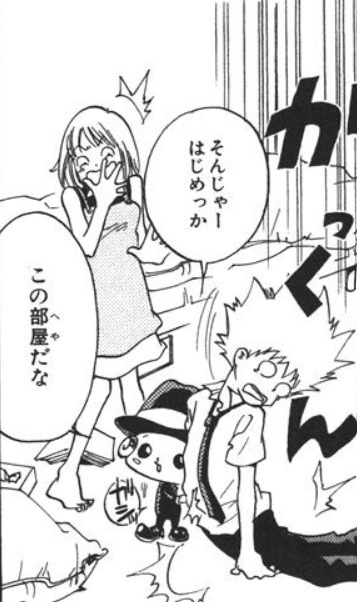
Again, all of these are treated as comedy, and Nana is just like any other anime/manga mother. She appears as a 1-dimensional character with no other role than to be there for every other character that isn't her son.
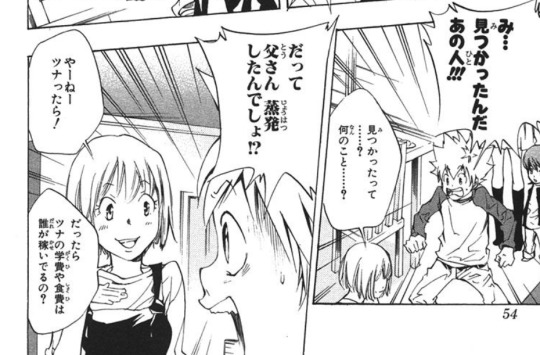
Nana, like Iemitsu, does the bare minimum for Tsuna as a mother. She does provide him with meals and a roof, however she completely neglects the emotional support the boy very obviously needs. There are instances in which she even belittles his feelings (such as when Tsuna was freaking out over his father's appearance and she proceeded to laugh and point out his naiveness at believing her lie).
What kind of freaking mother makes fun of their son for believing something they said?
Certainly not a good one!
And lastly, it was Nana who allowed and helped Iemitsu in being a bad father. Tsuna holds his mother in high respect because he believes Iemitsu abandoned her too, and that is why it is easier for him to forgive her and not his father. However, it was through Nana's emotional neglect that Iemitsu ended up ruining the image of a father in Tsuna's head — her passiveness is what allowed Tsuna to grow into the weak-willed character we meet in the beginning of the series.
In conclusion, both Iemitsu and Nana are to blame for Tsuna's loser behavior. So, if we're gonna talk about how bad of a father Iemitsu is, we should acknowledge the fact that Tsuna has a mother who allowed all of that to happen.
You're welcome to step up and shoot me, I'm open to constructive criticism!
#khr#katekyo hitman reborn#sawada iemitsu#tsunayoshi sawada#sawada nana#sawada family#khr reborn#khr characters#khr rant#khr iemitsu#khr nana#this took a lot longer than I thought#mini rant#manga panel
199 notes
·
View notes
Text
The Basement (Part Two)
Pairing: Dark! Cillian Murphy x Reader
Warning: Smut, CNC, Anal, Rough, Derogation
Four weeks after you signed the contract, you arrived at Cillian's house which, at least from the outside, looked like every other house on that street.
You were greeted by a woman named Mandy who took your bag and gestured for you to come inside.
"You brought clothes, that's sweet," she chuckled, raising an eyebrow as she led you into the house and you simply nodded shyly, feeling slightly intimidated by the thirty something year old woman.
"You know, you won't need them sweetie, so maybe leave them in the spare room for now," she then said, indicating a small room off the hallway.
Feeling like you had no choice, you quietly dropped your bag on the floor and followed Mandy down the corridor. The rich scent of expensive perfume filled the air, mingling with the faint aroma of exotic spices wafting from somewhere deeper within the house.
"Uhm, may I ask who you are? I didn't expect anyone but Cillian to be here," you said hesitantly, trying to get more information about your circumstances.
"Oh! That's right, you don't know me yet, do you?" Mandy replied coyly, winking at you. "I'm Mandy, a friend of Cillian's and I'm going to look after you for the next two weeks," she added cheerfully before taking your hand and leading you downstairs to the basement.
"Where is Cillian?" you asked Mandy as your heart pounded wildly against your chest. You couldn't help but feel anxious about what was coming next; the prospect of being trapped in this home for two whole weeks was terrifying but also strangely arousing.
"He's out at the moment, but will be back in a few hours," Mandy stated. "He asked me to get you ready for when he returns," she added, leading you down a winding staircase until you reached a dark but spacious room, containing a big, beautiful bed with chains, a leather chair, and a mirror on each wall. There was also a spa bath and small ensuite and whilst the room was nicely decorated, the sight of your windowless surroundings made your stomach churn nervously.
"What do you mean ' getting me ready'?" you then ought to ask, swallowing hard and Mandy smiled kindly at you. Her tone was soothing, almost maternal.
"Well, for starters, I will talk you through what you can expect from your stay here and then he has asked me to restrain you for your first encounter with him, just to make things more interesting," Mandy explained, reaching out to stroke your cheek gently. You flinched away instinctively — Mandy chuckled softly.
"You read the contract before signing it, didn't you?" Mandy asked, cocking her head slightly to one side, her brow furrowed in concern. The question hung between you—a loaded gun aimed straight at your guilt. Your eyes darted toward the corner of the room, avoiding any confrontation with the older woman.
"Yeah, I did," you finally admitted, mustering all of your courage.
"Good, then you should know what is about to happen," Mandy said, patting your shoulder reassuringly. "So, how about you undress sweetie, so that I can apply the restraints properly?"
With a weak nod, you began to unbutton your shirt while Mandy turned around. It felt strange to undress while someone else watched, especially since you knew what would happen once you were completely nude.
As you slipped off your shirt and pants, leaving only your underwear on, Mandy cleared her throat loudly before turning to face you again.
"Very nice, darling," she murmured, looking you over appreciatively. "Are you comfortable with wearing nothing at all?" Mandy asked, her voice softening. "If not, we can cover you up with a robe, if you prefer."
She seemed genuinely concerned about your comfort, which struck you as odd considering the circumstances. However, there was something oddly comforting about her gentle, patient manner. It made you trust her enough to respond honestly.
"No, I guess I'm okay with being naked," you managed to say weakly. "It feels weird, though."
You could see Mandy smile at your response, her expression warm and understanding. "It does, doesn't it?" Mandy responded sympathetically. "But I guess it makes things easier access wise," she then told you while you began to remove your bra and panties, leaving behind the stark reality of your vulnerability.
Mandy's gaze wandered across your body, taking in every curve and line. "Beautiful," she whispered under her breath. "You have such stunning curves, no wonder Cills took an interest in you."
The compliment left you feeling both flattered and embarrassed. "Thank you," you muttered awkwardly, averting your gaze to the ground.
"Now, please put your wrists behind your back," Mandy instructed in a soothing voice. You hesitated for a second before complying, apprehensive about what would happen next. You clumsily interlocked your fingers, feeling the cold metal touch your skin as Mandy attached the first chain. "How tight is this supposed to be?" you whimpered, squirming uncomfortably.
"Just right," Mandy answered confidently, tightening the chain further.
"A bit uncomfortable, but not too much." You tried to relax your shoulders, but the cold metal digging into your flesh made it impossible, which was something Mandy ought to ignore.
"Now lets talk about the particulars, shall we?" Mandy started, sitting you down on the edge of the bed. "Cillian asked me to go over some details with you so that you know exactly what to expect during your stay," she explained, her tone warm and friendly. "The first thing is that you'll be staying in this room for the entirety of your stay, unless he decides otherwise. All meals will be delivered to you and the bathroom is equipped with everything you might need, including fresh towels and toiletries."
You glanced around the room, noting the luxurious amenities.
"Now let me tell you what is expected of you, little one," Mandy spoke in a calming voice, her hands resting on your shoulders. "Cillian will come down here four or five times a day, to... entertain himself with you. This includes intercourse and anything else he wants to do. Anything he asks for, you do. No questions asked."
You swallowed hard, the lump in your throat growing larger by the second.
"Occasionally, he asks me to join in or hold you down for him," Mandy added casually, checking the chain's tension. "He will like to watch you struggle a bit and I can guarantee you that you will become rather sore after the first few days. But it's all part of the fun, isn't it?" Mandy said, patting your bare leg gently.
"Now you consented to him ejaculating inside you and the doctor has given you a depo shot two weeks ago to make sure you don't get pregnant. You also consented to anal sex and you agreed to him having sex while you are asleep, for which sleeping pills were prescribed to you, correct?" Mandy asked, her voice matter-of-fact.
"Uh-huh," you croaked, nodding feebly. Your throat constricted painfully, your breathing shallow and ragged.
"Good," Mandy nodded approvingly, patting your knee.
She paused, her tone turning softer. "Also, you understood that you are forbidden to masturbate or play with yourself, yes?"
"Yes," you managed to utter, blushing profusely.
"Good," Mandy said, patting your knee affectionately. "Now I will let you relax. Cillian should be here soon," she reassured you and you gave Mandy a weak smile, nodding in agreement.
The thought of enduring countless sexual encounters with Cillian, without any chance of escape or even self-pleasure, terrified you. Yet, a strange sense of anticipation began to wash over you. What kind of person would choose to endure such humiliation willingly?
The thoughts swirled in your mind, creating a whirlpool of confusion and doubt. You tried to rationalize what lay ahead, grasping at straws to justify your decision. Was it curiosity, perhaps? Or was it the lure of his fame that enticed you into this predicament? Regardless of the reason, you found yourself submerged in a sea of desperation as you faced the inevitable truth. You sighed heavily, casting a longing glance at the door, willing it to swing open and reveal the object of your fascination.
As the minutes ticked by, your impatience grew, gnawing at your insides like a ravenous beast. You were chained to the bed, naked, and time seemed to slow down, the seconds stretching into eternity until, suddenly, the door creaked open.
"Alright, little one," Cillian murmured, stepping into the room as he shut the door behind him. His presence sent a shiver down your spine, the mere sound of his voice causing your heartbeat to race.
"I can see that you have settled in nicely," Cillian said, his voice husky, as he walked closer to the bed. His eyes, bright blue, held a hint of excitement as they scanned your body.
You nodded silently, your throat constricting. Words failed you, replaced by a tumultuous mix of emotions. Fear, anticipation, shame, and arousal swirled within you, creating a whirlwind of sensations.
"Why don't you turn onto your stomach for me?" Cillian suggested, his voice calm and confident.
Your heart raced, but you managed to roll onto your belly, facing away from him while the chains twisted tighter, the rope tangling up at the bedhead.
"Perfect," Cillian murmured, running his fingers along your spine while caressing your upper thigh.
His touch sent goosebumps dancing up your arms, and you shivered involuntarily.
"Now tell me," Cillian prodded, his voice dripping with wicked intent. "Have you ever had anal before?"
You swallowed hard, your voice barely audible.
"N-no, I haven't," you stammered, your heart hammering against your ribs.
"And yet you agreed to it," Cillian murmured, his voice laced with a hint of satisfaction. "This should be interesting, then," he chuckled, his eyes twinkling with anticipation.
"Please," you whimpered, the word escaping your lips like a plea for mercy. "Just don't hurt me when you put it in there," you begged and Cillian's laughter echoed in the room, filling the space with an unsettling energy.
"Don't worry," he soothed, stroking your back gently. "I promise to be gentle. At least at first," Cillian murmured, his fingers trailing up and down your spine.
"You're trembling," he observed, pausing to brush loose strands of hair away from your neck. "Is it because you're scared?"
'A little,' you manage to squeak out, your breath hitching in your throat.
Perhaps it's the thought of the unknown, or the realization that you're bound to a stranger, powerless to escape his whims. Cillian smiles, his teeth white and perfect, the corners of his eyes crinkling with amusement.
"Don't be, I will ease you into it," he assures you, placing a warm hand on your back. "I might fuck your pussy a little bit first, that should loosen you up," Cillian said, unbuckling his belt and pulling down his pants, revealing his erect cock.
"And while I fuck your little pussy, I might start stretching your asshole with my finger," he continued, moving onto the bed.
"We'll see how that goes," he teased, crawling up behind you.
You gasped, the sensation of his throbbing member rubbing against your hip sending a jolt of anticipation rippling through your body. You could feel your juices pooling between your legs, soaking the thin mattress beneath you.
"Let's see how much you can handle," Cillian murmured, guiding his cock towards your entrance.
You braced yourself, your muscles tensing as you waited for the entry. He pushed, his length sliding effortlessly into your wet heat. Your moan echoed in the silent room, a muffled cry of pleasure reverberating off the walls.
"That's it," Cillian growled, each thrust driving deep within you. "Fuck, you are so tight," he groaned, his hips moving rhythmically, pistoning in and out of you. Each stroke sent waves of pleasure crashing through you, your muscles quivering with desire.
"Good girl," Cillian purred, his grip tightening possessively as he thrust deeper. "Take it all, baby. Show me how much you want it."
You moaned, your voice hoarse and desperate while Cillian groaned, his pace quickening.
"You're so wet, so hot," he moaned before pulling out of you abruptly.
"What are you doing?" you cried out, your voice cracking with frustration.
"Shhh, little one," Cillian murmured, stroking your back soothingly. "Relax, I'm just preparing you for what's to come," he said, kneeling between your legs, pulling you onto your knees so that your chain hands were resting on the bedhead.
He then thrusted in to your pussy again, harder than before, ramming into you like a jackhammer.
"That's it," he growled, his voice laced with lust. The room was filled with the sounds of your grunts and the slap of flesh meeting flesh.
"Now I will spread your ass cheeks apart. alright?," Cillian murmured, his voice laced with anticipation and you gasped, your body stiffening in anticipation. "So that I can see your little virgin hole back there," Cillian he then told you, squeezing your cheeks apart roughly.
You winced, your body protesting as he rubbed your asshole with his index finger, coating it with your pussy juice, making it slippery.
He then pressed his fingertip against your sphincter, applying gentle pressure.
You flinched, your body resisting the invasion.
"Relax," Cillian murmured, his voice thick with lust. "I'm just getting ready to stretch you out," he told you as he slid his finger into your rear, breaching the barrier with a gentle pop.
You gasped, a wave of discomfort washing over you.
"That's it," Cillian purred, his voice laced with anticipation.
"I'm just testing the waters," he said, adding another finger, widening the gap. "Can you feel it spreading wider?" he murmured, his voice husky with lust.
"It hurts," you whined, squirming beneath him.
"I know, baby," Cillian murmured, his voice thick with lust. "Just breathe through it," he said, pressing a firm kiss to your collarbone. "You're doing great," he praised, his voice laced with adoration.
You inhaled deeply, letting out a shaky sigh as you adjusted to the intrusion.
"Good girl," Cillian praised, his voice laced with satisfaction. "Now, lean forward onto your elbows," he instructed, slipping his fingers out of you.
"I want to prepare you for my cock," he said, stroking your back soothingly.
Without hesitation, you complied, leaning forward onto your elbows, presenting your sore little hole to him.
"Good girl," he cooed, kissing your back. "This might feel a little cold now," he warned, lubing himself up with a generous amount of K-Y Jelly. He then positioned himself behind you, his hard cock pointing directly at your ass.
You shuddered, bracing yourself for the impending invasion. He grabbed your hips tightly, holding you steady as he rested the tip of his cock against your opening.
"It's going to hurt a little," he murmured, his voice thick with lust. "But remember, it's all part of the experience," he reminded you, his words a whisper against your ear.
You closed your eyes, taking a deep breath and exhaling slowly.
"Ready?" he asked, his voice low and gravelly. You nodded, your heart pounding in your chest.
Suddenly, he thrust forward, the head of his cock breaching your entrance.
"Oh god fuck, you are too big," you screamed, your muscles spasming in shock.
"Shhhh, baby," he murmured, his voice softening. "Just breathe through it," he repeated, pressing a tender kiss to your exposed neck. "You're doing great," he praised, his voice thick with adoration.
Cillian continued to work his cock into your rear, inch by excruciating inch. His rhythmic, deliberate movements felt as though he was carefully sculpting you, carving his path deeper and deeper.
"It hurts," you yelped, your voice breaking. "Fuck!" you spat, squirming beneath him.
"Shhh, baby," Cillian cooed, his voice thick with lust. "This is what you wanted, right?" His words were meant to taunt you, but they served a different purpose altogether.
"You wanted me to use you," Cillian murmured, his voice soft and soothing as he pushed all the way into your rear.
"To claim you, own you, and fuck you however I wish."
You whimpered, your muscles clenching involuntarily. Every push sent a sharp pain shooting through you, but it was accompanied by a growing sense of fullness which felt strangely satisfying.
"Tell me what you think about me using you like this, Y/N," Cillian breathed into your ear, his hot breath fanning your neck.
The command, so blunt and demanding, left you stunned, unable to form coherent words.
"Come on, little one," Cillian urged, his voice softening. "Tell me how it feels."
You struggled to find the words, your voice cracking as you forced out a reply.
"It feels strange," you croaked, your breath hitching in your throat. "Fucked up, actually."
Cillian chuckled quietly, his warm breath fanning your neck. "I bet it does," he murmured, his tone dripping with smug satisfaction.
"What else?" he asked, his voice husky with lust.
Cillian's question hung heavy in the air, a weighty reminder of the depth of your surrender. You squirmed, feeling his erection pulsating inside you, filling you up in ways you never imagined possible.
"It feels dirty," you confessed, your voice breaking. "Like I'm just your toy," you said as your voice trembled, a quiet whine echoing in the room.
Cillian laughed, his voice deep and rich with satisfaction. "Exactly," he replied, his tone laden with triumph as he thrusted into you again, hard and fast.
You gasped, your body responding despite the agony coursing through you.
"You're mine now," he proclaimed, his voice echoing with confidence. "My little toy."
The words stung, yet there was a bizarre sense of satisfaction in knowing that you belonged to him, body and soul.
"Oh god, why am I enjoying this?" you asked, your voice strained and desperate as the pain increased. "Why do I crave more?" you asked out loud, confused by your emotions.
Cillian smirked, his eyes gleaming with mischief.
"Well, clearly you like being dominated, controlled, and used," he said. His words cut deep, but there was a strange allure in the idea that you were a natural slave.
You felt ashamed, disgusted, and utterly helpless as you accepted the truth. You were indeed a natural slave, thriving under the control and domination of others.
"I think you enjoy it even though it hurts, don't you?" he asked, his manhood relentlessly plunging into your ass. With each brutal thrust, you could feel your resistance melting away as the intense pleasure consumed you.
"No, I don't," you lied, your voice cracking. But deep down, you knew he was right. You did enjoy it - the roughness, the pain, the complete submission to his desires. It was liberating, freeing you from the constraints of societal norms and expectations.
"You're a liar," he growled, his fingers gripping your hips tightly. "Admit it, you love being dominated and controlled."
"Oh god," you panted, feeling your insides tighten around his massive shaft.
Cillian chuckled, his voice deep and dark as he pulled out slightly, before slamming back into you, sending a jolt of pain through your core.
"Your ass is going to be so sore after this," he gloated, his cock thrusting mercilessly into you. "It's going to hurt a lot actually," he teased, grinning wickedly while you moaned at the sheer thought of it all.
"And guess what? I won't let you cum until you've earned it so the pain will be even worse," Cillian said, his voice dripping with wicked delight. "You'll beg and plead for release, but it won't come until I say so."
You shivered, the prospect of endless torture exciting you beyond measure. This is what you signed up for, you reminded yourself. A man who possessed the ability to dominate and control you completely. The idea thrilled you, sending a surge of adrenaline coursing through your veins.
"Now, I need you to hold nice and still for me while I fill your little hole with my seed," Cillian murmured, his voice thick with lust. "Are you ready for me to mark you as mine?"
You nodded, your heart racing with anticipation. As Cillian withdrew his cock, you felt a sense of loss, a void forming within you that only his presence could fill.
"Put your face down in the pillow," Cillian ordered, his voice commanding. "I'm going to slide in deep now, baby," he said, positioning himself behind you once more.
"I want to feel you squeezing my cock with your tight little channel, begging to be marked with my seed."
You could hear the hunger in his voice, a palpable force that resonated loudly through the room. The thought of being claimed, owned, and possessed by him excited you beyond belief. You moaned softly, arching your back in anticipation.
He rammed his cock back into your now gaping rear with such force that it hurt, causing you to scream out in pain.
"Ah! Fuck!" you yelled as tears welled up in your eyes from the intense penetration.
"Good girl, let me hear those pretty little screams of yours!" Cillian roared, his words punctuated by the forceful thrusts of his cock.
You grimaced, biting on the edge of the pillow to muffle your cries. "Ow! Ah!" you groaned, your voice muffled and shaky. Despite the mounting pain, you couldn't help but revel in the sensation of being thoroughly taken by someone so unrelenting.
"Here it comes, baby," Cillian rumbled, the words vibrating against your skin as, with a final, triumphant thrust, he surged into you, filling you to the brim with his seed.
You cried out, the sudden influx of warmth overwhelming you.
"There we go," Cillian murmured, a satisfied grin playing across his lips. "Now tell me, how does it feel?" he asked while withdrawing his cock slowly, causing your gaping hole to shrink almost instantly.
"It burns," you whispered, your voice quivering as you felt his hot semen leak out of you, staining the bedding beneath you. "But I loved it," you admitted, the words tasting bitter on your tongue.
"I knew you would," Cillian chuckled, his voice dripping with pride. "Now you're mine."
You flinched, a wave of dread washing over you. Now that it was done, the reality of your situation hit you like a ton of bricks.
"What happens now?" you asked hesitantly, your voice trembling.
"It's simple, really," Cillian replied nonchalantly, his voice laced with amusement. "I'll continue to use you as I please, whenever I please. And you'll learn to accept your new role as my pet," he explained before giving you a quick wink and untying you from the bed.
#cillian murphy#cillian murphy smut#cillian murphy imagine#cillian murphy x y/n#tommy shelby#cillian murphy x reader#cillian murphy x you
210 notes
·
View notes
Text
There’s not, like, a million people being weird about infinity nikki being a female protag game with inherently feminine elements, in fact there’s a lot of rightful praise. But there’s still like these fringe persons that imply feminine things are either childish or shallow.
There’s genuinely good feminine media, be it Rose of Versailles as one of the progenitors of the shoujo genre or Sailor Moon as the grandmother of magical girls with complex themes sbout gender, sexuality, grief, loss, interpersonal relationships, sociological relationships on both micro and macro level, war and grief and the horror of violence. And female protagonists that are well beloved, like Xena or Ripley or Bayonetta or Elle Woods, and female performers that get both love and hate for just existing on a spectrum of femininity like Dolly Parton or currently Chappell Roan.
But there is a sort of sad aspect that feminine things are considered lesser and childish so they either don’t get made or they get made badly.
Korra being treated poorly as a show, Young Justice getting cancelled because too many girls and young women enjoyed it and they didn’t want to cater their sakes towards them. Any female character in a show being thrown away for the sake of male characters either by the media itself or by fandom.
Again it’s not that big of a problem in Nikki that I’ve seen, really maybe ten people I’ve seen total, and I just like complaining on my blog, but that doesn’t mean it’s not a problem that exists in the general sphere of things, and often it is also women who have a disdain for femininity that can also perpetuate this.
Sometimes feminine things being forced down women’s throats can cause a reluctance if not disdain for it, which is completely fair, while also sometimes that can be turned into a knee jerk negative reaction ti anything inherently feminine, similarly men may turn up their noses at things presented feminine because it’s emasculating or even queer (derogative) to them. “Cozy” games tend to be considered feminine, as well, with this assumption they’re unserious and without stock. A game doesn’t have to be grimdark and sweaty to be seen as legitimate and worthy of time.
infinity Nikki’s popularity I think can help showcase a positive example of something feminine that’s not inherently made just for children, has genuinely good and intriguing themes, and is overall a good and fun game (though I will say one can rightfully criticize the gacha element of it). It treats femininity with respect and offers a spectrum of girlhood and thankfully lots of people enjoy it; I hope it allows more femininity a seat at the media table.
Granted, this is of course a USAmerican perspective of fandom and culture, wherein I don’t have much contact with Chinese or other Nikki fandom, so the phenomena could also just be isolated by the fact the US is in a fucked up situation right now.
7 notes
·
View notes
Text
The Evealia Guide Through Babel (event) - Part III
Last time we left off, things are going absolutely terrible. There's a Sarkaz that is gone insane with sorrow for his comrades and his son, so he's taken it with himself to go destroy the Leithanien he's noticed lurking around Kazdel.
Leithanien. From Babel.
I'll just let you read this part on your own for cinematic value.
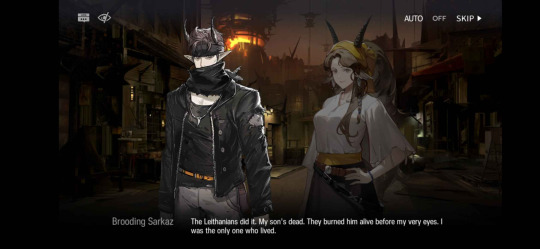
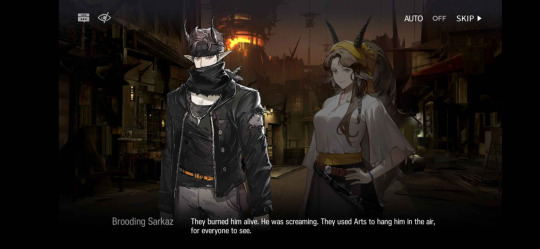
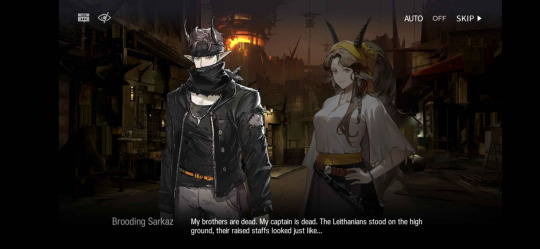
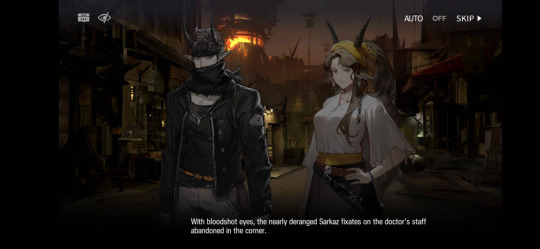
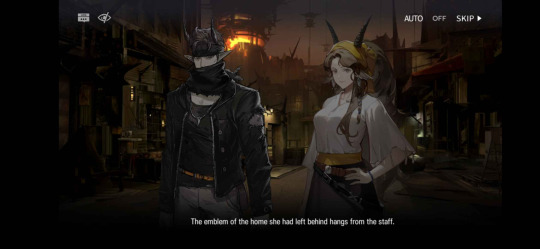
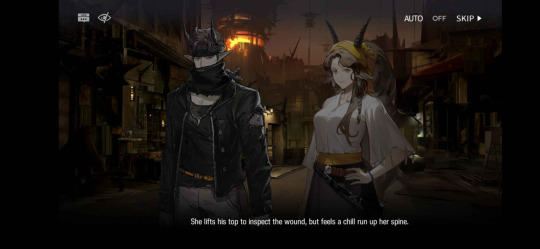
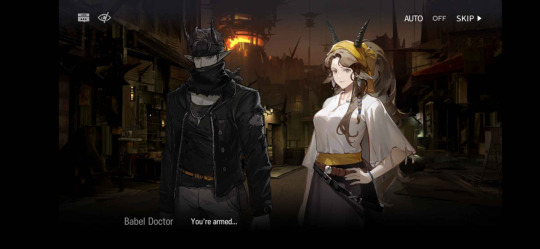
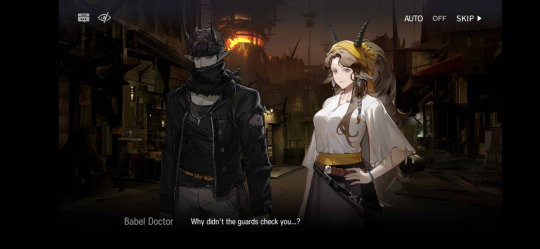
GOOD GOD ALRIGHT


Damn it... Ugh.
He is sent to Theresa, but he's so out of it that he doesn't even realize what is going on. He very happily tells her that he killed the traitorous Leithanien and has avenged his son, along with all the others who died in battle.
He's taken away since Theresis doesn't want Theresa to be the one meting out punishment like that.
It's strange though, because he doesn't use Arts, but the guards were hypnotised. Somebody on the outside is at fault for this. Yet, the Military Commission refuse to investigate, because the victim is just an outsider to the Sarkaz.
Babel is to remove itself from all political activity too and finally make some clear boundaries between what it can and cannot do on Kazdel.
In a different light, we get to see Theresa and Theresis as caretakers for Ascalon.
Theresis gives her knife back and teaches her, briefly, about how she should sharpen it since warriors should treasure their weapons, while also being considering on who it gets to cut.
Theresa is much softer on the approach. Asks her about what she likes in the city.
Despite that, Ascalon feels like she can't really hate the gentle Sarkaz. I SCREAMED when Theresa offered Ascalon to touch her horn. Is it a way to show affection? Vulnerability? Whatever it is, WHY did I not think of this sooner. That's so heckin adorable.
Theresa cleans Ascalon's wound and teaches her that weapons can't heal these - only time and medicine. So one day she can wake up and learn that it doesn't hurt anymore.
That much, Ascalon agrees with.
Babel Classroom, Kazdel
…
Well, nobody showed up to class.
Except Theresis, who is there to confirm that the casualty report from the Military Commission states a lot of children have gone. Those who survived - their parents refuse to let the outsiders of Babel teach them. Plus, many of the Babel teachers left - out of fear.
Even if Theresis thinks Theresa is wasting her time, he waits with her upon her request.
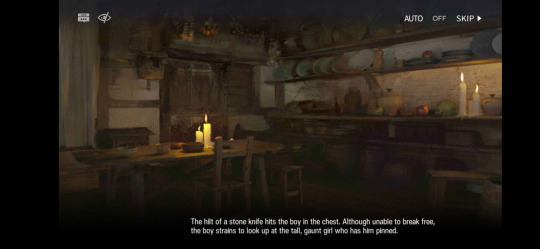
IT WASN'T FOR NOTHING!!
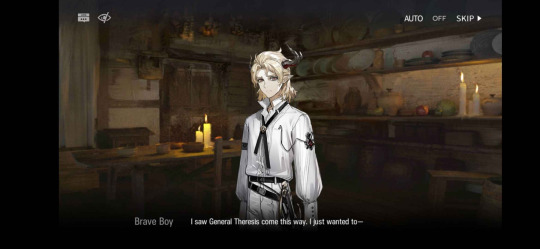
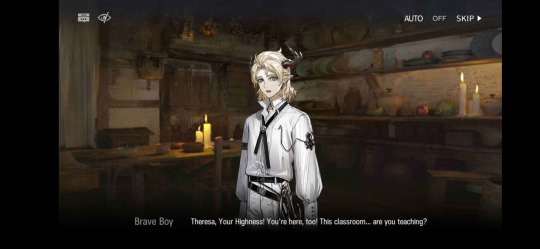
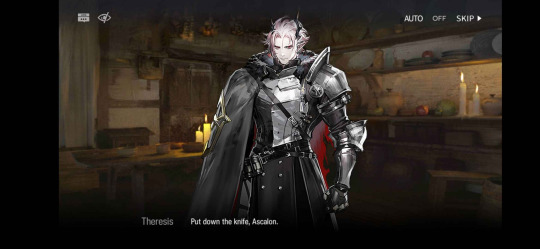
Down, Dog.
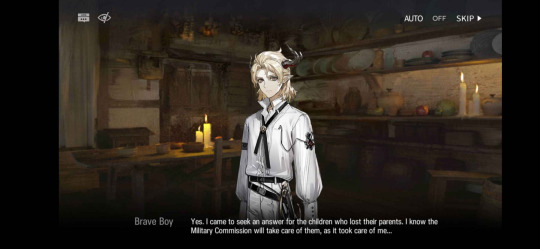
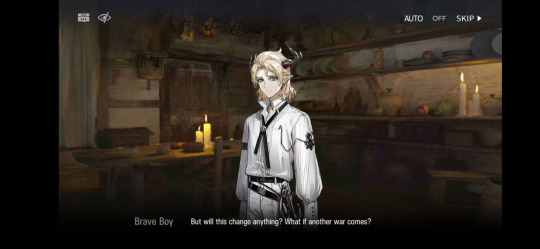
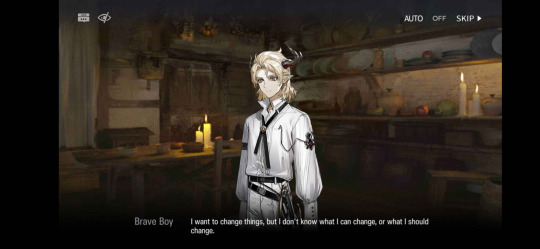
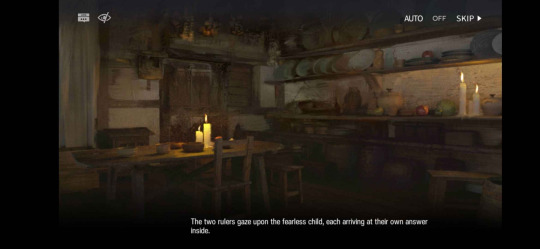
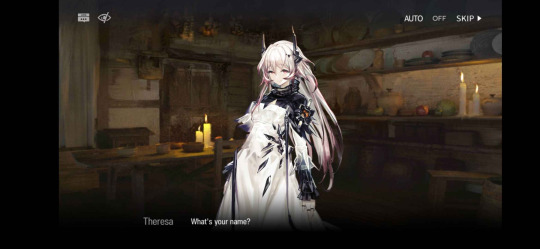
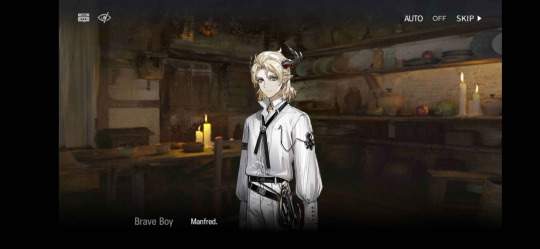
ARRRGHBFEUSUGIH MY HEART.
I hated him, okay? I hated Manfred in the way you'd hate a handsome scrimblo, in the way where I'd be ashamed to say that I like him; like how people who love stinky cheese don't want others to know, they just sit in the corner eating it and hope that nobody is going to notice the smell.
I liked him for his perseverance before and because he was so very 'aware' unlike other leaders we've seen in the past. Meanwhile, I'm being set up with this charming little creature that just wants change for the better, wants peace, and wants to help.
HOW DARE YOU MAKE ME ADMIT I LIKE HIM?!
Now I suddenly wish he does not die. Now I get upset when I remember I derogatively called him Milfred out of rage. I never managed to pass CC 9 or 10, I forgot which one was Ashring, but now??? I'm mean to NOT be upset???
I hate it here.
Within Kazdel, Goodluck and his son are… either waiting for the worst to happen or they're morning the loss of their third family member. Goodluck can't really stand sitting around, doing nothing, so he is planning to become a mercenary and make the people who hurt his wife pay.
Before departing he gives her name to his son - Odda. And promises to teach him how to fight with her weapon once he returns.
---
BB-3 Before
Silent Crack
[Today, though, we face the tragic reality of disunity and betrayal.]
Eight Years Ago...
Summer, 1086
Classes are being held in Kazdel, secretly. Kids have to keep their voices down and they're not allowed to tell anybody about what is happening inside their secret little base of operation.
The war between Kazdel and Leithanien never stopped, so for 18 years they've been pursued. A lof of people feel into despair, either from the ghost of war or the infection.
Within the Scar Market, Goodluck picks up a commission - some teacher in Kazdel has been saying too good a thing about Babel. Somebody is willing to pay to shut them up.
We learn that it's been a while since Goodluck was in this part of Kazdel. Although Goodluck doesn't remember a lot of things, he remembers the look of his front door - the address where that supposed 'teacher' might be hiding.
Inside, said Teacher is really doing good. He's teaching the children that the Sarkaz blame Babel for their misfortune since they have nobody else. Babel brought the enemies, Babel's medicine makes Oripathy worse, Babel this and that-- and children nod along, because they probably hear that from their parents a lot.
It's not quite so, though; they can't take things at face value. That's why they have to see, learn and think for themselves.
Odda notices somebody at the door. Everybody scrambles to hide before he opens it and sees...
Surprisingly, it's Ascalon.
She scans the sparsely furnished room and understands.
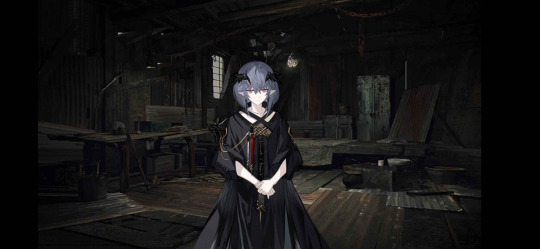
...
She says 'Thank you for sheltering him. But you must leave'.
It's clearly a warning for oncoming danger. The teacher has to go. Odda stays by the door - a habit of his since he was little. As if he was waiting for someone familiar to come back home.
From the shadows, Goodluck recognises him immediately. He's unfortunately already bound with his own mission and knows there's only one way to ensure his child gets a better life.
Ascalon makes the decision for him. Her mist shrouds the corpse, erasing all traces of its existence.
[The passing of a life in Kazdel is akin to a speck of dust falling to the ground, unheard, unceremonious, and unnoticed.]
[His luck ran out.]
Manfred seems to also have been in the area at the time of this occurrence. They fight a little, both at friendly terms, though they serve different sides of Kazdel.
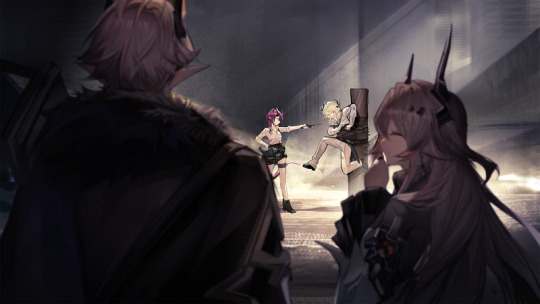
It drives up a memory of another time they were sparring.
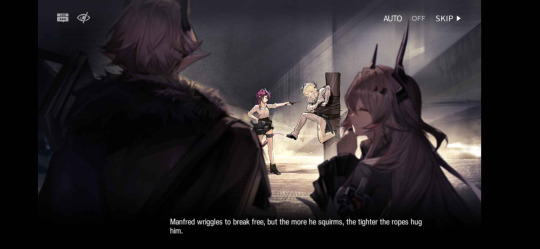
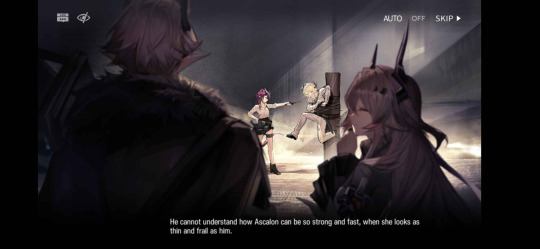
THEY EVEN LAUGH TOGEHTER, because Theresa helps Manfred down by levitating him to safety.
Though adorable, we're back in the present with Ascalon and Manfred fighting. There's a misunderstanding between their approaches I think. Manfred has remained by Theresis' side because he thinks there can be a different approach to the future they're looking for. Since the start Theresis has been hesitant with Theresa's plan, so now they have parted ways.
On the other side, Ascalon has turned her back on Theresis out of anger that he'd allow the others in Kazdel to badmouth Her Highness and her choice to stick with Babel.
Manfred is more understanding than ever though. It's not really the twin sovereigns who had to make the decision of parting. It's just circumstance. Perhaps the prophecy.
They're so caring for each other though... These four care about each other so much I want to put them in a box and keep them together forever.
Sadness isn't over by the way~
Because Manfred appears on Odda's door with his dad's... remnants. Odda doesn't really remember him, but Manfred doesn't make much of it as he presents the items and explains:
[There have been some disturbances in the city, and I'm afraid your father... I'm so sorry.]
[Wh-Where did you find them? Was there...?]
[There was nothing else left at the scene. I'm sorry.]
[...]
[What's your name?]
[...Odda.]
[If you need any help...]
[No... no, I'm very grateful that you brought these back. It's been a long time since I last saw him... this is enough. I don't have to wait anymore... He's not coming back...]
[Do you have family? Or friends you can count on?]
[I can take care of myself. Besides, we see things like this every day in this city, no?]
[...]
[I-I'm sorry I gushed, sir. I just feel like I know you, somehow... I'm sure you're busy. I won't keep you any longer.]
[My condolences.]
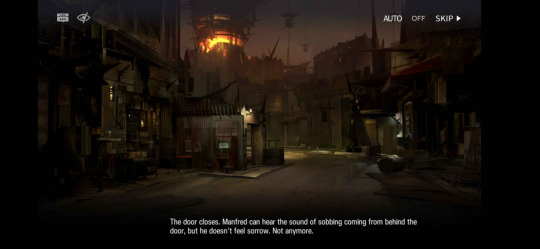
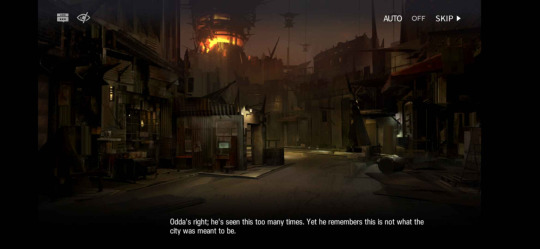
THIS IS NOT FUNNY

WHAT THE HECK ITS NOT FUNNY, YOU'RE NOT ORIGINAL?!?!?!?!?
I've never cried so hard in my life, oh no I'm broken.
---
BB-3 After
There's been an accident - feelings are mixed.
A father beat his child for trying to defend the Teacher, and the Teacher fought back with the father to defend the kid. In the end, both of them were going to die from their injuries. He was set upon by the angry crowd and it escalated from there. The turmoil dragged in everybody - Civilians, Babel, mercenaries, even the Military Commission.
Somebody blew up the Babel office building, so then Royal Court troops were involved.
Theresa has made the decision to remove Babel from Kazdel. It's become way too dangerous for any of the personnel to stay any longer, since they're now completely unwanted. Odda immediately signs up to leave with them.
Out on the streets, the dying teacher is mocked by the Sarkaz soldiers, but he's actually seeing an invisible to others little banshee - Logos. He was there in the classroom and learned a lot from the Teacher.
Even if others did not believe it so, the Sarkaz Teacher is welcomed by the myriad of souls and he's guided to them with the little banshee's song.
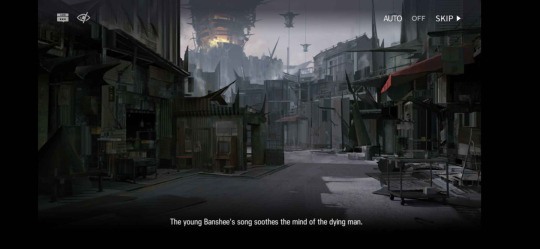
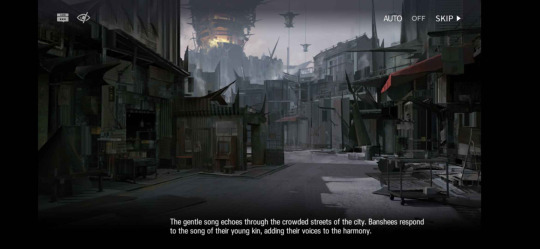
[It is an elegy that commemorates the passing of an ordinary Sakraz.]
['You were talking about the future of Babel in the lesson, but you didn't get to the end. What were you going to say?']
['I believe... that Babel will die someday. I hope I'm wrong.']
In the court, Laqeramaline is saying goodbye to Theresa. It's a sweet conversation they have, with the Banshee Queen being as truthful to her beliefs as she is supportive to Theresa. She also knows there is no other way, so all she can do from the position of a mother is hope for the best.
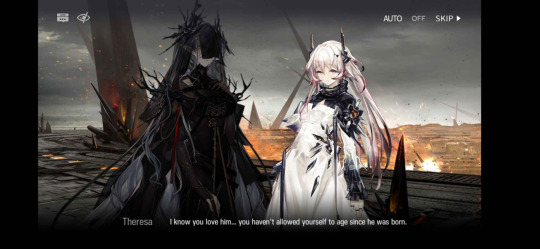
#arknights#arknights event#doctor arknights#memes#arknights sarkaz#arknights babel#babel event#arknights theresa#arknights theresis#arknights ascalon#arknights pv#arknights commentary#Eve cried again#Arknights furniture#arknights lore#arknights story#thanks#arknights doctors#friendship#part 3#arknigths logos#arknights manfred#arknights banshees
12 notes
·
View notes
Text
Reconsidering what I explained in my last post here about RinHaru's relationship up to season 2, now i feel like I've seen most of the whole picture:
Rin is quite devoted to his relationship with Haru. I mean, their friendship and rivarly.
I noticed that Rin was the one to mostly make the moves, demostrate and say out loud his feelings for Haru (to the point that was kinda obvious and even Sousuke take note of that).
While, in the other hand, Haru...I feel like he's autistic or something.
Haha.
And I'm not saying this in a derogative meaning or with intentions of hurting anyone!! I'm hoping to not be that ignorant for using a term that does not apply here (correct me if that's the case)...but what I'm trying to say is that, actually, this treat of his character is just endearing: he doesn't speak that much, he's always straight-forward, silent and less expressive than others...this treat is one of the reasons why people like him so much, also something I like about him a lot, but to not lose the main topic: I think that's one of the reasons why I felt so one-sided his relationship with Rin.
I noticed that, after having to share much more time with Rin than the past time after their winning at final S1, especially in the movies, Haru was much more expressive both in speech and actions than before. And also, that makes sense!
S1 is him and Rin's conflict, mixed-up with the past-present and the construction of the clubs. This season was quite deppressing, in a way because of so much sour feelings in each character (mostly Rin and Haru) for their complications, so their 'happy side' was touched mostly at the end.
S2 they were focusing on their future and their own problems with the competitions and their respectives groups (alongside with Sousuke's story and Makoto's heavy participation). They were quite far from each other because their interactions were not a neccessity for the plot, and again, their 'happy side' and important interactions were handled mostly at the end.
S3 was heavely about Ikuya and Haru's story (that, at least, 7 episodes), and about their preparation to reach global levels. They were, still, a little much far from each other because their interactions, again, were not needed for the plot at that moment.
So, finally with the movies, the circumstances were the ones where they were going to interact with the other on one way or another. At the end, they were literally competing against each other, in the same group, against the same people (Albert, the other gringer/blond guy which I don't remember his name but was a hard swimmer also). They had quite a lot more meaningful interactions because they were together at the end of the day, participating in the same game...and while it was beautiful, I felt like finally I could see the reciprocity of Haru's feeling for Rin in terms of their relationship.
They were rivals after all, friends that worry for each other, that searched for the other when something bad happened, that supported, admired and inspired the other to be their best. And, something more beautiful, is that they wanted that. Both of them: To be together in that, racing to win. And they did, they won...and even after time passed and they met again in Bulgary...they kept swimming together.
I still feel that Rin is more vigorous when it comes to the relationship, but Haru's side is clearer now and I think I can say that, yes, this was a rivals to friends, meant to be, and they're both into it.
Thanks for reading this, which I consider to be one of the many internal disputes I have when watching two characters I like too much and I also ship them together.
#rinharu#harurin#rin matsuoka#haruka nanase#free! anime#not going to ignore Makoto's clear feelings for Haru#but also Sousuke's feelings for Rin#at the end#Makoto and Rin literally were the ones to reach to Haru in his critical moments#both were so gay for Haru#while Haru was like: I love you both...but water#and that's it#I've come to that conclusion#almost all characters were gay#sharkbait
39 notes
·
View notes
Note
Do you think Sokka didn't receive enough flak for derogating Katara, the last representative of their element? Did he ever properly apologize?
I would normally say yes, but I've been thinking about it and sometimes I hear people say Katara doesn't get called out for belittling Sokka's efforts and increasing his insecurity. And I always took that as ridiculous because he would always mock her for her bending anyway, but him being insecure is connected to the role he thinks he had to protect the village
(I still don't understand why non bender women couldn't fight in their village. It would really tone down people who say he had to provide food for his WHOLE village like none of the adult women could fish and like Sokka didn't routinely fail at getting food in the whole show.)
Katara herself says she does all the work while he plays soldier which could be true but I can also see how people could take it as her mocking him for failing at being a good warrior.
He never properly apologized, and I would say neither did Katara for her comments, but she kind of did in "Jet" and she does acknowledge he makes the plans in the future. I can't recall if Sokka ever praises her for her bending, but he does stop mocking her too, so it could be called even?
I think Sokka's sexism tips the scale a little where I would say he did worse, but hearing both sides makes me back off a bit on Sokka's degrading comments though they still are a lot.
Bending is very important to Katara and being a warrior to Sokka, and both are connected to their parents. I don't consider it a flaw of the show, but there could have been more tension between these two in how they unintentionally struck each other where it hurt the most.
In Sokka's case it could even be intentional because of how much Katara would be loved for her bending and how they lost their mom because of it, and in Katara's case it could be in retaliation to Sokka's words.
13 notes
·
View notes
Text
Personality Theory (Big Five Personality Traits)
Chiyo Mihama: The prodigious young girl with a childlike innocence and an elevated intellectual capacity for her age can be analyzed through the Big Five personality model, particularly in terms of Openness and Conscientiousness. Her high intellectual capacity reflects high Openness, and her diligent study habits and moral compass suggest elevated Conscientiousness. However, her emotionally immature traits align her with lower levels of Neuroticism, as she generally exhibits low levels of anxiety or emotional instability.
Osaka (Ayumu Kasuga): Osaka’s character can be understood through the lens of Neuroticism and Agreeableness. Her tendency to daydream, her occasional moments of anxiety, and her introspective nature reflect a higher score on Neuroticism. Her agreeable and passive personality trait makes her approachable and non-confrontational, though her social interaction limitations suggest some degree of Introversion as well.
Tomo Takino: Tomo’s energetic and ambitious nature may be analyzed through the Extraversion and Conscientiousness dimensions. Her extroverted behavior is evident in her active, competitive approach to life, and her high drive aligns with Conscientiousness, although her impulsive and erratic behavior reflects lower Agreeableness and higher Neuroticism, often leading to conflicts with others.
Sakaki: The quiet, reserved, yet highly empathetic character of Sakaki can be considered through the Introversion and Agreeableness lenses. Her preference for solitude, her passive behavior, and her intense inner emotional world align her with higher Neuroticism and lower Openness. The dichotomy of her tough exterior and vulnerable inner life might also be explored through Attachment Theory, where her complex relationship with her self-image and social interactions points toward a more insecure attachment style.
Cognitive Development (Piaget and Vygotsky)
Chiyo: Piaget's theory of cognitive development suggests that children move through stages of cognitive development, and Chiyo's intellectual precocity suggests she may be in a more advanced cognitive stage (Formal Operational Stage). This contrasts with her emotional and social immaturity, pointing toward a cognitive-emotional developmental gap, where advanced cognitive abilities don't align with her emotional regulation or social understanding.
The Group Dynamic: From a Vygotskian perspective, the interactions among the characters can be analyzed in terms of the Zone of Proximal Development (ZPD). Characters like Chiyo and Osaka learn from their more socially and emotionally mature peers, such as Sakaki, who acts as a model for emotional regulation. However, the entire group learns through shared experiences, allowing for collaborative learning that fosters cognitive and social growth.
Social Identity and Ingroup/Outgroup Dynamics
The characters in Azumanga Daioh are a part of a cohesive, close-knit group. Social Identity Theory (Tajfel & Turner) helps explain how the group dynamics within the class create a sense of belonging and the formation of an ingroup. Characters with different personalities often display how social cohesion is developed through shared experiences (e.g., school activities, shared humor). The group, therefore, exhibits classic behaviors of ingroup favoritism and outgroup derogation when interacting with outsiders (e.g., other students or teachers who don't align with the group's dynamics).
Ingroup solidarity is seen in how the girls interact and protect one another emotionally, even if they have individual differences (e.g., Osaka’s clumsy nature and Chiyo’s intellectual dominance). Their interactions reflect the Intergroup Contact Hypothesis (Allport), where prolonged positive contact leads to greater group cohesion and less intergroup prejudice.
Self-Determination Theory (Deci & Ryan)
Tomo represents an ideal example of an individual who is motivated by intrinsic goals. Her high energy, competitive nature, and constant drive suggest a high need for autonomy and competence. However, her excessive extrinsic motivation (such as her desire to outperform her classmates) points to some controlled motivation. This can lead to frustrations and interpersonal conflicts when her need for competence isn't met, as seen in her dynamic with Chiyo and Sakaki.
Sakaki may be analyzed as a person struggling with autonomy and relatedness, as she seeks emotional connection but often feels alienated due to her personal limitations. Her attachment to animals (particularly cats) serves as a coping mechanism, providing her with a sense of competence and relatedness in ways that are harder to achieve through human relationships.
Attachment Theory (Bowlby)
Many of the characters exhibit distinct attachment patterns that could be tied to their social behaviors. Tomo, for instance, may be considered to exhibit characteristics of an anxious attachment style, as evidenced by her tendency to seek validation through her achievements. Sakaki, on the other hand, displays characteristics of an avoidant attachment style, avoiding emotional closeness yet longing for deeper emotional connections (e.g., her attachment to animals).
Chiyo and Osaka might represent more secure attachment styles in the sense that they are generally emotionally stable, have positive interpersonal interactions, and express their feelings in manageable ways. Osaka's more passive behavior could be indicative of an ambivalent attachment, wherein she craves emotional comfort but is unsure of how to express it appropriately.
Neurodevelopmental Considerations
The varying degrees of cognitive and emotional development among the characters can be understood in light of neurodevelopmental theories. The differences between characters like Chiyo and Osaka reflect individual variances in executive functioning and emotional regulation, which may be influenced by different rates of brain maturation and environmental factors (e.g., upbringing, experiences with peers, and education).
The characters in Azumanga Daioh display a variety of social and emotional responses that can be analyzed in terms of neuroplasticity—how the brain adapts and rewires itself based on social experiences and emotional learning. The interactions between the students create an evolving network of social behaviors that might promote or inhibit further cognitive and emotional development.
2 notes
·
View notes
Text
apparently the "time immemorial" idea was something civilians came up with in the 13th century to rationalize the somewhat-chaotic treatment of custom in Roman law:
There thus remained many interpretative choices for the time of custom when Bartholomew of Brescia commented on Gratian’s text around 1245. He maintained the general idea that “for custom to prevail against law, one requirement [was] that it gain force through the passage of time,” and that “one must be able to say it is ancient and approved.” Yet, he wondered: “What custom would you consider long, or how many repetitions would you say introduce a custom?” Looking to Justinian’s Corpus iuris civilis led only to different mathematical questions. Was it “what is done twice?” as said one part of the Code, or “what is done three times?” as said another, or even more than three times, as yet another part of the code said? Or did it work like “long prescription” and take ten times to take hold? Or was it something “done from beyond memory”? Was it twice as in criminal law? Or was a fourth time necessary? For Bartholomew, three types of calculations could generate the time of custom: adding up the number of repetitions, looking at the total length of time, or identifying the passage of so much added time that it was timeless.
Ultimately, he did not choose. In a later gloss, seeming somewhat frustrated, Bartholomew concluded: “Briefly, you may take it that it suffices according to the canons that custom be reasonable and have gained force through passage of time.” Custom and its relationship to time were difficult to define, even in learned circles. Bernard of Parma (Bottoni, d. 1266) said as much when emphasizing the extent to which it is difficult to prove a custom or prescription.”
As this suggests, canon lawyers were increasingly drawing an equivalence between custom and prescription, so between rules or dues and other rights created (or lost) through the passage of time. Bernard of Parma explicitly defined the Liber extra’s “legitimately prescribed” custom by the canon-law prescription of forty years. Roman jurists of the later thirteenth century, such as Guido da Suzzara (c. 1225–92), also began emphasizing this equivalence.
Bernard, however, also noted that the kind of custom that could derogate from law was one which did not exist in the memory of man. The notion that custom existed beyond the realm of memory went back to some of the oldest glosses on Justinian’s Corpus iuris civilis: custom, according to Placentinus (d. 1192), must be ancient and go beyond the memory of man. Custom was tagged to the longevity of tradition, which transcended the temporary individual. This was not, as has been stated, a traditional understanding of custom. There was no mainstream late antique or early medieval tradition of custom that described it as originating beyond human memory. Instead, this notion—which later became so important in English law—seems to have been developed by twelfth-century Roman jurists who wrote glosses that introduced this new strand of thinking in legal theory, one that placed custom beyond the realm of memory.
There is a certain strangeness to the notion of time beyond memory. After all, how can something be known to be beyond memory? For Augustine (354–430), it was God who was beyond memory. He described “passing beyond memory” as transcendence that permitted one to come closer to God. The turn of phrase does not seem to appear in Roman law. Bartholomew of Brescia, for instance, knew that a “time immemorial” was one of many temporal possibilities for defining custom in his own time but finding ancient authorities on the subject was a problem. The only reference he found to a time beyond memory in Justinian’s Corpus iuris civilis did not refer to custom at all, but to water currents: “The flow of water, whose origin is beyond the memory of man, is considered to have been lawfully established in the place through which it passes.” It seems that the notion of custom as harkening to a time beyond memory was a twelfth-century innovation.
Custom as defined by time immemorial was by no means the dominant strand in Romanist thinking in the twelfth and thirteenth centuries. Even Placentinus had an alternate definition, general but closer to his sources, where custom was introduced by popular practice over time. John Bassianus (twelfth century) fixed the time of custom to ten years, a time of prescription in Roman law. Soon afterward, Azo Porcius (fl. 1150–1230) argued that “long” custom was the kind maintained ten or twenty years, “very old” was maintained for thirty or forty years, and “age-old” was maintained for forty years. He also counted custom in terms of judgments. These had to be plural—one sole judgment was not enough to produce a custom; there had to be “at least two.” As for the idea that custom came from time immemorial, Azo noted, “Yet some say that long custom is one which does not exist within memory.” His response? “This does not please me.”
it's a good idea, Azo!
22 notes
·
View notes
Text
reading books written in like 1800s is so interesting bc i see them use "queer" v casually to mean strange or weird and im like Wow how can anyone see this , combine it w the knowledge that queer evolved into a word to mean lgbt , and then still deny that its a slur. Like this change in meaning didnt just happen overnight and clearly evolved from ppl calling lgbt people weird and strange and considering that it was also illegal they were likely using it derogatively.... hello
#i dont think this makes any sense as a post i cant cohesively write rn#i just think of this whenever i see queer in old books
3 notes
·
View notes
Note
Happy STS! You asked me this yesterday, so I'm going to get you back; are there any fun swears in your world? Or any otherwise innocuous customs that are considered rude in certain parts of the world?
There are many different curses and swears, however for the interest of brevity, I will be focusing just on a few used around the southwestern shores of Lake Shebali in the land of Kishetal, more specifically the area around Labisa, homeland of Ninma, Narul, Zatar, Suru, etc etc.
This will in essence just be a list of insults and swears and their appropriate uses within Kishite society.
Note that insults and swears are different from curses, which are specifically meant to elicit harm through some sort of ritual. While most curses are mere superstition, with the proper funds and access to sagecraft, certain curses may actually provide the desired effect. As a result, "cursing" or other forms of dark magic are strictly banned within Labisa, though this has not stopped the proliferation of underground "curse mongers". An example of a curse: hum akir shukalaf tiwaz kadaf er akir tatunuf alpanunuf (hoom /ahk-eer/ shoo-kah-lahf / tee-wahz /kah-dahf/ er /ahk-eer/ taht-oon-oof/ ahl-pah-noo-noof) May his spear be broken and his arrows dull A fairly common curse, usually carved on things like broken pottery, meant to cause impotence.
Before you continue reading CONTENT WARNING: PROFANITY AND ADULT REFERENCES YOU HAVE BEEN WARNED
To keep this short I will only address the words Tuk, Sush, and Balka with a few variations (though certainly not all) as well as a couple of rude gestures and some random swear words:
Tuk/Tuki/Tukut: Fuck/ Fucking/Fucker (specifically in an animalistic or barbaric manner)
Shabalic origin, identical to that used in Shabala. Seshit/Seshiti is the more polite/proper way of saying this
Tukipahut: Father-fucker (more accurately "daddy" fucker, paha being the diminutive version of pa or father. This particular insult is typically used in reference to people who are spoiled, rich, or bratty, in some sense it can be thought of as a nepotee, someone that relies on a more powerful relative or partner.)
Tukimahut: Mother-fucker (similar to above, though without the nepotism angle, typically much more generally used)
Tukikihut: Child-fucker (The reverse of Tukipahut, an insult applied to nepotists, those that favor their own children. Can also be used in the more literal sense.)
Tukizubut: Pig-Fucker (A filthy or disgusting person, pervert, or literally what it means. Pig, Zubu, is a popular insult itself and is interchangeable with the word Balka below)
Tukijabut: Sheep-Fucker (derogative word for people that do not live in cities/ "hillbilly")
Tukisaramukut: Butter-Fucker (Specifically used in reference of Makurians and Kishites who live on the other side of the mountains, this is the even more insulting version of Ukishut Saramuk "butter eater")
Naholitukut: Dead Fucker (Literally a fucker that is dead, when written or spoken as a single word this is used to refer to someone that is impotent or otherwise unable to perform thus "dead")
Tukwa Dab/ Tukwa Dabub: Fuck you / Fuck yourself
Sush/Sushi/Sushut: Shit/Shitting/Shitter (Specifically human)
Shabalic origin. Duz/Duzi is the more polite way of saying this
Ukishut Sushub/Ukisush: Eater of Shit (A general insult, a disgusting person, a jerk)
Ukishwa Sush!: Eat shit
Akkut Sushub/Akksush: Speaker of Shit (A particularly vulgar way of saying "liar")
Mishuzut Sushub/Misusush: Kisser of Shit (A suck-up, sycophant)
Pabakazut Sushub/Pabsush: Hunter of Shit (A poor person, someone who digs through refuse on the street for scraps or other valuables)
Balka- Dog (unwanted, feral, dirty, not quite equivalent to the English use of the word bitch closer to something like mutt.)
Shabalic origin. Kuba is the polite equivalent.
Balka-Duwushut: Stupid Dog (Someone that is uneducated and typically poor, the more vulgar version calling someone Duwushut/Duwush: Stupid)
Balka-Maluwut: Dirty/Filthy Dog (What it sounds like)
Ushbalkut: Dog food (Typically used to refer to an enemy, someone that is going to be killed and thus "eaten by dogs" this can also be used as a threat or a curse)
Sushbalkut: Dog shit (a nuisance, an annoying person)
Kip Balkub: Child of a dog (What it sounds like, when Balkub is replaced with Zubub, thus Child of a pig, this is used to mean, bastard)
Random Swears/Insults
Kunpu/Kunput: Ass (Either the body part, a person acting in an annoying matter, or on rare occasions a "bottom" though this is more often hurpu/hurput literally "hole")
Ikuwa: Ass (animal)
Pibisa: Piss
Olbi: Drunkard (stemming from Olibis meaning wine)
Gur: Ugly
Nahsha: Barbarian/Savage/Forestfolk (Literally no bread)
Duwush: Stupid
Kip: Child (Context)
Luya: Prostitute/Whore (Used for people of any sex or gender, the more polite or even dignified version of this is Luluya)
Bushku: Cock (The more dignified version of this would be Uluku)
Yusha: Cunt (The more dignified version of this is Uluma)
Kiluki: Rat (Thief, a sneaky person)
Kilukuki: Weasel (Popular pets/pest control, name is used to refer to a foolish person)
Pefu: Fart
Rude Gestures and Actions:
Holding the index and middle finger up with all other fingers tucked in and the palm facing a person (The peace sign) is the equivalent of calling someone Luya or else an adulterer, the two fingers being representative of multiple phalluses. Two thumbs up has a similar meaning.
Showing a person the bottom of your foot at any time is rude as it implies a disparity of status.
Sticking out one's tongue is considered vulgar, and may be used by prostitutes as a way of attracting customers.
Covering one's head while indoors is considered highly rude, the exception being helmets and if status permits, crowns.
Hissing (like a cat or snake) is considered a sign of deep disrespect if done between adults, as this is typically associated with grabbing the attention of naughty children.
Always greet the oldest person first when making formal greetings, addressing someone else is considered rude.
Mixing wine or pouring beer only for oneself is considered rude, it is customary to offer to pour for at least one other person, and only after they accept or refuse can you prepare some for yourself.
When eating if a person takes a bite off of a piece of food and then sets the rest of said piece back on the serving dish from whence it came this is considered incredibly disrespectful, thus why Kishic food is served in a manner that allows for it to easily be either eaten in bite sized pieces or broken into pieces without the use of teeth. Basically if the food leaves the plate, it cannot go back, even if that means you must hold the food until you finish eating it all.
#writeblr#writing#fantasy#worldbuilding#fantasy writing#testamentsofthegreensea#fantasy world#conlang#profanity#constructed language#world building#sts asks#sts#fantasy worldbuilding#narul
5 notes
·
View notes
Text
One of biggest three shonen series good enough for you? /s

Punkitt was clearly making a general point about what's considered to be beauty/transition goals at the moment, from her shared experience and perspective.
I find it weird as fuck to imply every trans women person wishes to become white. I'm pretty sure they would find it pretty insulting.
Now, if you meant to adress SEA beauty standards which historically include whiteness as sign of beauty, that would be different. I don't see that mentioned anywhere in the post though.
rabbidly attacking trans women
If you think polite tumblr post asking you to cinsider why you bring race into topic completely not involved with it is 'rabid attack' you need therapy.
Or to become more literate. :)
Also? Not sure what precious bubble you live in, here in reality when a yaoi poll pitted a western couple and SEA couple, 90% of responses were 'can't let some white trash win'.
But please, tell me more about the fantasy land whre 'white' is never used as derogative adjective, must be cute.
you will probably not look like a skinny white anime girl when you transition you will likely look like someone's mom and you need to realize how swag this is
157K notes
·
View notes
Note
I don't wanna be that guy but I wanted to add to your post as an Adonis stan: Adonis is never treated as being Japanese within the text. He's mixed, his mother is Japanese, and took the decision to more or less raise her children in the culture of the country where they spent most of their time (not uncommon IRL). Neither he nor the other characters consider it. It's not about "internalized" racism, it's about racism on the part of the writers. Doylist explanation for a Watsonian question, I guess. Mixed kids have complex feelings on identity and if he decided not to consider himself such that'd be one thing, but it isn't even posed as a question
Thank you for adding on!
100% agree with that point about Adonis not being treated as Japanese. I wouldn't personally call it a "grey area" but I suppose he's... treated as Japanese when convenient? For example, with language, if my memory is correct, it's stated that he did learn a bit of Japanese before coming to Japan. The thing is, it's necessary for him to know Japanese in-text in order for him to interact with other characters, and also in order for HappyElements to explain hiring a native Japanese speaker to voice him without doing an accent. So if anything, it seems to be "fortunate" for him to be half-Japanese when it comes to his writing. Otherwise, it isn't kept in mind.
It could have been a chance to point out how Adonis being treated as a foreigner and having his Japanese background unacknowledged is not unusual form of prejudice against mixed kids. In particular, those with appearances strongly leaning towards one ethnicity are forced to identify exclusively with that ethnicity rather than deciding for themselves. However, not only is that clearly not the direction taken with Adonis - it's been done in a better fashion with Aira.
For Adonis' upbringing, I wonder how strong his exposure to each culture is, since we do see that he was in the Middle East/SWANA in his youth, but he also has had some interaction with Japanese culture before coming to Japan. Like you've mentioned, it's by no means unusual for his mother to bring him to Japan and raise him with Japanese culture - it's just that there's the question of how strong his mother's influence would have been, how much he retained from SWANA, the exact things that he was taught... But again, definitely worth noting how him being raised in Japanese culture is both a) a fact and b) unacknowledged.
Then, with other characters not acknowledging that he's Japanese and treating him exclusively as a foreigner, my current theory is that it has something to do with his appeal being The Foreign One, and so if his Japanese heritage is acknowledged too often, it would "weaken his charm point" or something to that effect.
Since I never really posed it as a Watsonian question, I don't mind the application of a Doylist perspective. The reason why I don't tend to lead in with Doylist explanations myself is because fandom spaces can be remarkably hostile towards them, hence I try to ease my way into them. Additionally, while I do definitely have my own opinions on this matter, I want to make sure that I'm showing other interpretations, too. I'm thankful to see the application of a Doylist lens, and if you don't mind me elaborating more, this is why I want to go into the idea of internal racism with regards to choices made among the writing team.
Enstars explicitly condemns racism, but something that literature in sociology and psychology has started to elaborate on is that condemnation of racism alone isn't enough for someone to not be racist. One can condemn acts of racism while still holding racist views. Some theories that explore this are modern/symbolic racism (belief that discrimination doesn't really exist anymore, derogation of groups isn't based on their racial background but on their "inferior cultural values"), aversive racism (rather than feelings of hostility and aggression, one feels fear and discomfort around outgroups) and ambiguous racism (one holds both positive and negative stereotypes - assumes that the former cancels out the latter).
So, for Enstars, the condemnation of racism alone isn't a defense against racist values to some because that shows their external values, but it does not show their internal values. There are different ways of expressing racism, and just because someone discourages 1 way of expression doesn't mean that they themselves may never engage in the other 99.
From my memory, what little Enstars has had to say on Arab culture has been far from the best (but since my memory has been pretty weak on this point, I've been trying to read up more. By all means if anyone else wants to add, they're free to do so). That's why there have been very strong concerns of anti-Arab sentiments, which you may be interested in since I feel that this, in tandem with many other things said on this topic, may work with your point about racism in the writing team (which I certainly hope to address in the future). Additionally, that's a very important part of comparing Adonis' writing to Aira's, since it ties into concerns of racism that people have had for a while, which have only grown stronger with Aira's addition to the franchise.
He does state in his !!-era self-description that he's "born to a Japanese mother and a foreign father", which I personally took as him identifying with both to some extent - but of course, identity is more than just a sentence, and while Enstars has "said" that he identifies with both cultures, its up to them to "demonstrate" it. His identity really hasn't shaped any of his interactions, and for reasons that you mentioned yourself, I wouldn't be astonished if people who read a portion of his stories without reading his profile never came to the conclusion that he is mixed since it's truly an ignored part of his self conception and other characters' conception of him.
Thank you for mentioning this, since the lack of acknowledgement of his Japanese heritage is something that I've thought about, too. As I read more, I can only wish that this topic is elaborated upon and clarified, and hopefully my perspective above may have been of interest to you. I hope you have a nice day!
3 notes
·
View notes
Link
0 notes